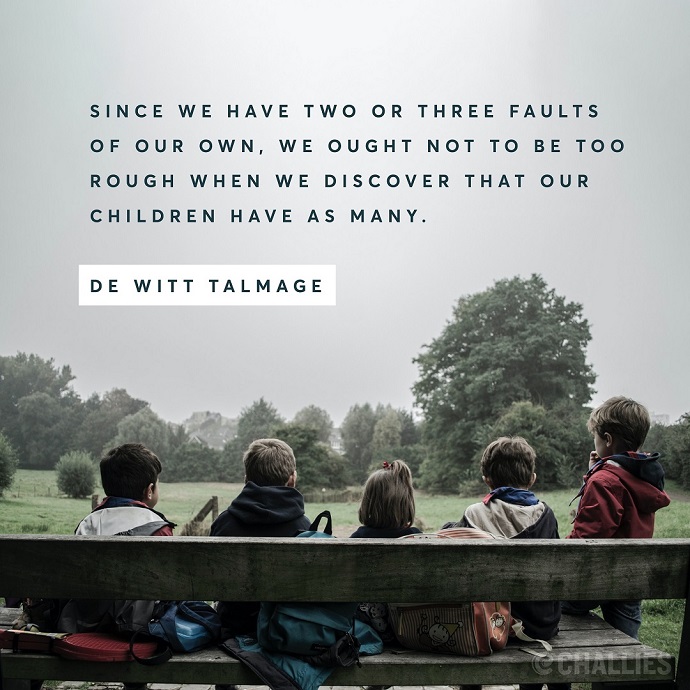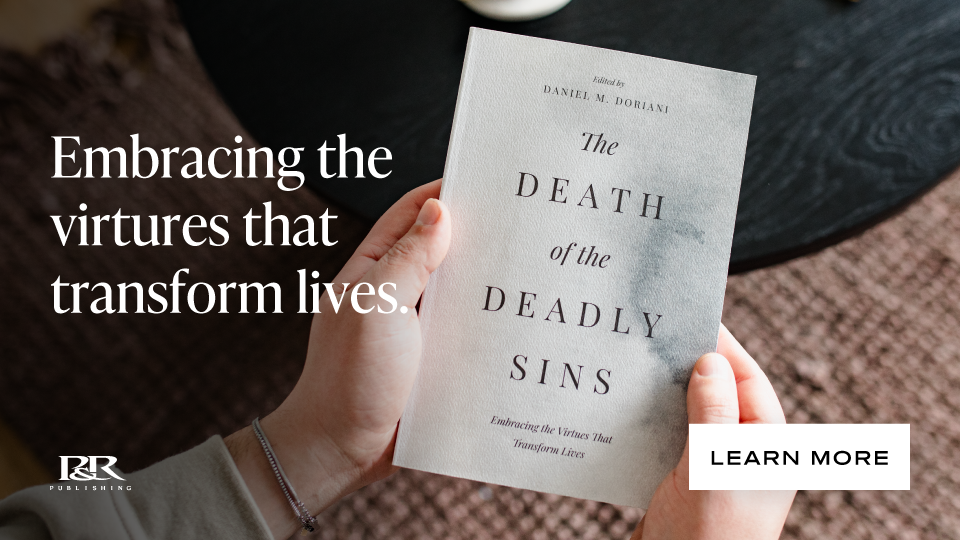 ]]>
]]>| This page is current as of July 2024. For recommendations on other books and an introduction to this series, visit Best Commentaries on Each Book of the Bible. |
There is no shortage of commentaries on Genesis and, thankfully, no shortage of recommendations. The most pressing and divisive issues include the authorship of the book and, of course, the most faithful understanding of creation.
Before turning to the expert recommendations, here are some recent commentaries written by trusted scholars that may be of interest. Because these volumes are newly published, the commentators on the commentaries have not yet had opportunity to evaluate them. They would, though, come with my recommendation.
- Richard Phillips – Genesis (Reformed Expository Commentaries). Part of the REC, this one was first prepared and written as a series of sermons so is suitable for any reader. It is sold as a two-volume set. (Amazon, Westminster Books, Logos)
- Richard Belcher – Genesis: The Beginning of God’s Plan of Salvation (Focus on the Bible). Both the author and the publisher have proven themselves trustworthy when it comes to the difficult textual decisions. (Amazon, Westminster Books, Logos)
And now, here are the expert recommendations:
Gordon J. Wenham – Genesis 1-15 and Genesis 16-50 (Word Biblical Commentary). This series is certainly not known for being user-friendly; the volumes are also uneven with some being far superior to others. However, most experts rate Wenham’s work as one of their top recommendations for Genesis. Tremper Longman rates Wenham as “one of the finest evangelical commentators today” and says that his “commentary on Genesis shows a high level of scholarship and his exegetical sensitivity.” His approach to Genesis is conservative and he stresses the unity of the biblical text. (Amazon: Volume 1, Volume 2. Westminster Books: Volume 1, Volume 2. Logos: 2 Volumes)
Victor P. Hamilton – The Book of Genesis Chapters 1-17 and Chapters 18-50 (The New International Commentary on the Old Testament). Most commentators on commentaries commend Hamilton for his thoroughness in examining the interpretive difficulties in Genesis and his generally conservative conclusions (though some are frustrated that he ends up ambiguous regarding Mosaic authorship). After a helpful examination of the various ways of understanding the creation story, he advocates a literary interpretation of Genesis 1. (Amazon: Volume 1, Volume 2. Westminster Books: Volume 1, Volume 2. Logos: 2 Volumes)
Allen Ross – Creation & Blessing. Ross’ text is not a commentary per se but more of an exposition meant to help the preacher. He holds to a six-day creation and to Mosaic authorship. Instead of going verse-by-verse, he proceeds section-by-section in the way he recommends preaching the book. Keith Mathison calls it “an invaluable resource for expositors” and insists “if you are a pastor, you should not be without this book.” I have used this volume several times and have found it a very helpful aid. (Amazon, Westminster Books, Logos)
John D. Currid – Genesis Volume 1 and Genesis Volume 2 (Evangelical Press Study Commentary). Derek Thomas provides a very strong recommendation for this two-volume set which he says features “easy to read yet biblically robust expositions that seek to bridge the gap between technical and popular commentaries.” Currid advocates Mosaic authorship and a literal six-day creation. (Amazon: Volume 1, Volume 2. Westminster Books: Volume 1, Volume 2. Logos: 2 Volumes)
Derek Kidner – Genesis (Kidner Classic Commentary). This volume was formerly part of the TOTC series. Kidner’s work, like his other volumes in the TOTC series, is far shorter than the other recommendations. This, along with his conversational style, make it eminently readable. The short format necessitates great concision which can be both a help and a disappointment; the preacher will definitely need to supplement with more thorough volumes. Still, this makes an excellent commentary to begin with and an excellent choice for those looking to bypass some of the scholarly works. Nearly every scholar gives it his recommendation. (Amazon, Logos)
Here are a few other common recommendations:
- Bruce Waltke – Genesis
- Kenneth Mathews – Genesis 1-11:26 and Genesis 11:27-50 (New American Commentary)
- John Sailhamer – Genesis (Expositor’s Bible Commentary)
 May the Lord be with you and bless you on this fine day. What Can the Church Do About Child Protection? “Our theological convictions about the dignity of all people made in God’s image, our understanding of the Bible’s standards for Christian character, and its demands for how we care for the vulnerable must lead to changes in the way we view abuse prevention and child protection.” Briggham Winkler offers churches some direction in protecting children from abuse. Are There Two Creation Accounts? “One often hears the idea that there are two creation accounts in Genesis 1–2, almost as if it were intuitively obvious.” And while there are differences between Genesis 1 and 2, does that mean there are truly two separate and contradictory accounts? Trust Through the Dark Brings Triumph in the Dawn “Christian, the night may feel long, but the light will dawn again. You can’t put trust in circumstances changing in the way or timing you desire, but you can trust the One who rules over them. And he cannot be unfaithful to his promises.” The lasting legacy of ordinary believers What a joy to know that God carries out his work through very ordinary people like you and me. Step Into the Sand & Dip Your Toes in the Water Lauren draws a lesson from an unimpressive (but enjoyable) beach. Testimony of the Mind and Heart Rebekah considers testimonies that involve the heart and the mind. “Some of our encounters with Christ are dramatic, sudden, and emotional, while some are more…]]>
May the Lord be with you and bless you on this fine day. What Can the Church Do About Child Protection? “Our theological convictions about the dignity of all people made in God’s image, our understanding of the Bible’s standards for Christian character, and its demands for how we care for the vulnerable must lead to changes in the way we view abuse prevention and child protection.” Briggham Winkler offers churches some direction in protecting children from abuse. Are There Two Creation Accounts? “One often hears the idea that there are two creation accounts in Genesis 1–2, almost as if it were intuitively obvious.” And while there are differences between Genesis 1 and 2, does that mean there are truly two separate and contradictory accounts? Trust Through the Dark Brings Triumph in the Dawn “Christian, the night may feel long, but the light will dawn again. You can’t put trust in circumstances changing in the way or timing you desire, but you can trust the One who rules over them. And he cannot be unfaithful to his promises.” The lasting legacy of ordinary believers What a joy to know that God carries out his work through very ordinary people like you and me. Step Into the Sand & Dip Your Toes in the Water Lauren draws a lesson from an unimpressive (but enjoyable) beach. Testimony of the Mind and Heart Rebekah considers testimonies that involve the heart and the mind. “Some of our encounters with Christ are dramatic, sudden, and emotional, while some are more…]]>
May the Lord be with you and bless you on this fine day.
What Can the Church Do About Child Protection?
“Our theological convictions about the dignity of all people made in God’s image, our understanding of the Bible’s standards for Christian character, and its demands for how we care for the vulnerable must lead to changes in the way we view abuse prevention and child protection.” Briggham Winkler offers churches some direction in protecting children from abuse.
Are There Two Creation Accounts?
“One often hears the idea that there are two creation accounts in Genesis 1–2, almost as if it were intuitively obvious.” And while there are differences between Genesis 1 and 2, does that mean there are truly two separate and contradictory accounts?
Trust Through the Dark Brings Triumph in the Dawn
“Christian, the night may feel long, but the light will dawn again. You can’t put trust in circumstances changing in the way or timing you desire, but you can trust the One who rules over them. And he cannot be unfaithful to his promises.”
The lasting legacy of ordinary believers
What a joy to know that God carries out his work through very ordinary people like you and me.
Step Into the Sand & Dip Your Toes in the Water
Lauren draws a lesson from an unimpressive (but enjoyable) beach.
Testimony of the Mind and Heart
Rebekah considers testimonies that involve the heart and the mind. “Some of our encounters with Christ are dramatic, sudden, and emotional, while some are more quiet, protracted, and cerebral. One isn’t better than the other, of course. Each is simply evidence that God works with each of us where we are at the time, with what we bring to the table.”
Flashback: 12 Marks of Excellent Pastoral Ministry
This is what an excellent pastor does. and the solemn commitments he must make.
]]> For reasons that are obvious, publishers do not release a great many books in July as summer reaches its peak. That said, while they do not release a lot of books when judged by quantity, they do release some significant works when judged by quality. With that in mind, here are some of my picks for July’s New and Notable books. In each case I’ve included the editorial description. The Visual Word: Illustrated Outlines of the New Testament Books by Patrick Schreiner. “Every Christian wants to love the Bible. But let’s face it: we sometimes get lost in all the names, places, and doctrines that we find in its pages. Who wrote this epistle? Which book is about justification? Joy? Jesus? Aren’t they all about him? The New Testament contains complex ideas and multiple genres. Keeping it straight can be hard to do. Wouldn’t it be nice if somebody who understands the big picture would put it together for us in one place? Biblical scholar and seminary professor Patrick Schreiner draws from his years of experience as a teacher to offer a simple and memorable way of understanding Scripture. And he doesn’t do it by throwing big words at you. The contours of the New Testament and its underlying structure are depicted in visual format along with Schreiner’s clear explanations. In The Visual Word, the Bible comes alive because you can see it pictured before your eyes. By taking a graphic approach, you’ll notice connections you’ve never seen before. Gain insights you’ve missed all these…]]>
For reasons that are obvious, publishers do not release a great many books in July as summer reaches its peak. That said, while they do not release a lot of books when judged by quantity, they do release some significant works when judged by quality. With that in mind, here are some of my picks for July’s New and Notable books. In each case I’ve included the editorial description. The Visual Word: Illustrated Outlines of the New Testament Books by Patrick Schreiner. “Every Christian wants to love the Bible. But let’s face it: we sometimes get lost in all the names, places, and doctrines that we find in its pages. Who wrote this epistle? Which book is about justification? Joy? Jesus? Aren’t they all about him? The New Testament contains complex ideas and multiple genres. Keeping it straight can be hard to do. Wouldn’t it be nice if somebody who understands the big picture would put it together for us in one place? Biblical scholar and seminary professor Patrick Schreiner draws from his years of experience as a teacher to offer a simple and memorable way of understanding Scripture. And he doesn’t do it by throwing big words at you. The contours of the New Testament and its underlying structure are depicted in visual format along with Schreiner’s clear explanations. In The Visual Word, the Bible comes alive because you can see it pictured before your eyes. By taking a graphic approach, you’ll notice connections you’ve never seen before. Gain insights you’ve missed all these…]]>
For reasons that are obvious, publishers do not release a great many books in July as summer reaches its peak. That said, while they do not release a lot of books when judged by quantity, they do release some significant works when judged by quality. With that in mind, here are some of my picks for July’s New and Notable books. In each case I’ve included the editorial description.
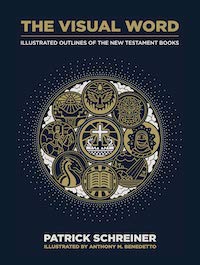 The Visual Word: Illustrated Outlines of the New Testament Books by Patrick Schreiner. “Every Christian wants to love the Bible. But let’s face it: we sometimes get lost in all the names, places, and doctrines that we find in its pages. Who wrote this epistle? Which book is about justification? Joy? Jesus? Aren’t they all about him? The New Testament contains complex ideas and multiple genres. Keeping it straight can be hard to do. Wouldn’t it be nice if somebody who understands the big picture would put it together for us in one place? Biblical scholar and seminary professor Patrick Schreiner draws from his years of experience as a teacher to offer a simple and memorable way of understanding Scripture. And he doesn’t do it by throwing big words at you. The contours of the New Testament and its underlying structure are depicted in visual format along with Schreiner’s clear explanations. In The Visual Word, the Bible comes alive because you can see it pictured before your eyes. By taking a graphic approach, you’ll notice connections you’ve never seen before. Gain insights you’ve missed all these years. And discover an overall pattern that makes each separate piece fall perfectly into place.” (Buy it from Amazon or Westminster Books)
The Visual Word: Illustrated Outlines of the New Testament Books by Patrick Schreiner. “Every Christian wants to love the Bible. But let’s face it: we sometimes get lost in all the names, places, and doctrines that we find in its pages. Who wrote this epistle? Which book is about justification? Joy? Jesus? Aren’t they all about him? The New Testament contains complex ideas and multiple genres. Keeping it straight can be hard to do. Wouldn’t it be nice if somebody who understands the big picture would put it together for us in one place? Biblical scholar and seminary professor Patrick Schreiner draws from his years of experience as a teacher to offer a simple and memorable way of understanding Scripture. And he doesn’t do it by throwing big words at you. The contours of the New Testament and its underlying structure are depicted in visual format along with Schreiner’s clear explanations. In The Visual Word, the Bible comes alive because you can see it pictured before your eyes. By taking a graphic approach, you’ll notice connections you’ve never seen before. Gain insights you’ve missed all these years. And discover an overall pattern that makes each separate piece fall perfectly into place.” (Buy it from Amazon or Westminster Books)
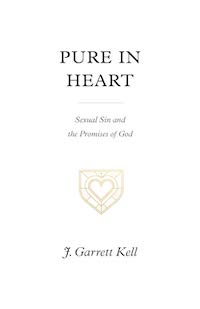 Pure in Heart: Sexual Sin and the Promises of God by Garrett Kell. “Many women and men trapped in sexual sin believe willpower is the key to overcoming temptation, but your shaky self-discipline doesn’t have to be the source of your strength. Sharing from his personal struggles, J. Garrett Kell explains that life-long transformation rests in the supernatural power of the Savior and the support of a local church. He offers profound insights into Jesus’s teachings on purity and provides you with long-term strategies for your own pathway to freedom. Written for both men and women struggling with temptation, this book is a vital resource for the church, encouraging a healthy, empathetic community to help brothers and sisters in Christ resist sin. The goal isn’t purity for purity’s sake, but delighting in God and trusting him for ultimate victory.” (Buy it from Amazon or Westminster Books)
Pure in Heart: Sexual Sin and the Promises of God by Garrett Kell. “Many women and men trapped in sexual sin believe willpower is the key to overcoming temptation, but your shaky self-discipline doesn’t have to be the source of your strength. Sharing from his personal struggles, J. Garrett Kell explains that life-long transformation rests in the supernatural power of the Savior and the support of a local church. He offers profound insights into Jesus’s teachings on purity and provides you with long-term strategies for your own pathway to freedom. Written for both men and women struggling with temptation, this book is a vital resource for the church, encouraging a healthy, empathetic community to help brothers and sisters in Christ resist sin. The goal isn’t purity for purity’s sake, but delighting in God and trusting him for ultimate victory.” (Buy it from Amazon or Westminster Books)
 Work that Matters by Daniel Doriani. “The work you do is one of the main ways you serve God & show love to your neighbor—& as you devote your time to it, it reflects, shapes, & defines who you are. When we work faithfully in ways that please God, we act as his hands in the world, providing for one another and pushing back against the effects of the fall. Writing to laborers in any field, Dan Doriani gives a brief and thoughtful overview of the Bible’s teaching on the nature, challenges, & opportunities of work. What does it mean to be faithful at work? How do we know if we are called to a certain kind of work? What makes our work good work? In a format suitable for individuals or small groups, he answers these questions, shining encouraging new light on the familiar & providing insights for self-evaluation.” (Buy it from Amazon)
Work that Matters by Daniel Doriani. “The work you do is one of the main ways you serve God & show love to your neighbor—& as you devote your time to it, it reflects, shapes, & defines who you are. When we work faithfully in ways that please God, we act as his hands in the world, providing for one another and pushing back against the effects of the fall. Writing to laborers in any field, Dan Doriani gives a brief and thoughtful overview of the Bible’s teaching on the nature, challenges, & opportunities of work. What does it mean to be faithful at work? How do we know if we are called to a certain kind of work? What makes our work good work? In a format suitable for individuals or small groups, he answers these questions, shining encouraging new light on the familiar & providing insights for self-evaluation.” (Buy it from Amazon)
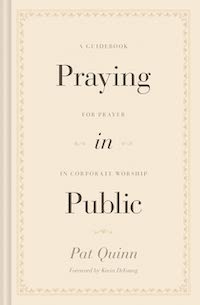 Praying in Public: A Guidebook for Prayer in Corporate Worship by Pat Quinn. “God commands his people to pray together and answers graciously when they do. The Bible specifically calls on church leaders to guide this essential form of corporate worship, but it can be challenging to pray boldly and confidently in front of others. This practical, step-by-step guide was created to help pastors and church leaders pray thoughtfully and biblically in public. Through seven guiding principles, Pat Quinn illustrates how to lead prayers of adoration, confession, and supplication to God, and covers the history of public prayer in Scripture. He also includes elegant, reverent, gospel-centered examples from the Latin Liturgy, John Calvin, the Puritans, John Wesley, and others, as well as many examples of his own congregational prayers. Pastors and church leaders will learn to glorify God more passionately, effectively intercede for the church and the world, and find joy—not fear—in praying publicly.” (Buy it from Amazon or Westminster Books)
Praying in Public: A Guidebook for Prayer in Corporate Worship by Pat Quinn. “God commands his people to pray together and answers graciously when they do. The Bible specifically calls on church leaders to guide this essential form of corporate worship, but it can be challenging to pray boldly and confidently in front of others. This practical, step-by-step guide was created to help pastors and church leaders pray thoughtfully and biblically in public. Through seven guiding principles, Pat Quinn illustrates how to lead prayers of adoration, confession, and supplication to God, and covers the history of public prayer in Scripture. He also includes elegant, reverent, gospel-centered examples from the Latin Liturgy, John Calvin, the Puritans, John Wesley, and others, as well as many examples of his own congregational prayers. Pastors and church leaders will learn to glorify God more passionately, effectively intercede for the church and the world, and find joy—not fear—in praying publicly.” (Buy it from Amazon or Westminster Books)
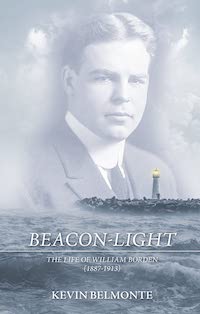 Beacon–Light: The Life of William Borden (1887–1913) by Kevin Belmonte. “Although William Borden was taken from this world at the young age of 25, the years he lived were full of dedication to serve. Kevin Belmonte draws on letters, quotations and images to paint a unique picture of William’s life of commitment to God, delving into the ways ‘vital truth,’ as William called it, was the star he reckoned by. In the telling of the life story of William Borden, there is much to learn about living a life of devotion to God. The desire to live for Christ guided and shaped William’s life, from his school days, right up until his death. With insightful extracts of letters and telling photos, the reader is taken on a journey through William’s life, from The Hill School, to Yale, to Princeton Seminary, and the beginning of his missionary training. Reading this book will give a wonderful view into Borden’s world, to know something of the voices and scenes he knew. A vital part of William’s life was his ‘Morning Watch’ (or what he also called his ‘breakfast’) – feeding on and contemplating the Word of God and growing deeper in his faith. It’s a privilege to have this unique insight into his life, and an inspiration for readers to strive to live such a life of devotion themselves.” (Buy it from Westminster Books)
Beacon–Light: The Life of William Borden (1887–1913) by Kevin Belmonte. “Although William Borden was taken from this world at the young age of 25, the years he lived were full of dedication to serve. Kevin Belmonte draws on letters, quotations and images to paint a unique picture of William’s life of commitment to God, delving into the ways ‘vital truth,’ as William called it, was the star he reckoned by. In the telling of the life story of William Borden, there is much to learn about living a life of devotion to God. The desire to live for Christ guided and shaped William’s life, from his school days, right up until his death. With insightful extracts of letters and telling photos, the reader is taken on a journey through William’s life, from The Hill School, to Yale, to Princeton Seminary, and the beginning of his missionary training. Reading this book will give a wonderful view into Borden’s world, to know something of the voices and scenes he knew. A vital part of William’s life was his ‘Morning Watch’ (or what he also called his ‘breakfast’) – feeding on and contemplating the Word of God and growing deeper in his faith. It’s a privilege to have this unique insight into his life, and an inspiration for readers to strive to live such a life of devotion themselves.” (Buy it from Westminster Books)
 Right Now Counts Forever: 4-Volume Collection by R.C. Sproul. “There is no such thing as a meaningless moment. Since we’re made in God’s image and created for His eternal glory, everything we think, say, and do today matters forever. The question is, How should this truth direct our daily lives? For more than forty years, Dr. R.C. Sproul wrote his recurring column in Tabletalk magazine, Right Now Counts Forever, to apply the teachings of the Bible and Reformed theology to everyday life. No topic was off-limits because every part of our lives bears enduring significance. Through the years, Dr. Sproul helped Christians give careful thought to topics in theology and history, politics and current events, relationships and entertainment, and more. In this four-volume collection, hundreds of Dr. Sproul’s columns have been brought together for the first time. Written to serve the church, this treasury of theological reflection can help guide believers of all ages to live with eternity in mind and devote all of life to the glory of God.” (Buy it from Amazon or Westminster Books)
Right Now Counts Forever: 4-Volume Collection by R.C. Sproul. “There is no such thing as a meaningless moment. Since we’re made in God’s image and created for His eternal glory, everything we think, say, and do today matters forever. The question is, How should this truth direct our daily lives? For more than forty years, Dr. R.C. Sproul wrote his recurring column in Tabletalk magazine, Right Now Counts Forever, to apply the teachings of the Bible and Reformed theology to everyday life. No topic was off-limits because every part of our lives bears enduring significance. Through the years, Dr. Sproul helped Christians give careful thought to topics in theology and history, politics and current events, relationships and entertainment, and more. In this four-volume collection, hundreds of Dr. Sproul’s columns have been brought together for the first time. Written to serve the church, this treasury of theological reflection can help guide believers of all ages to live with eternity in mind and devote all of life to the glory of God.” (Buy it from Amazon or Westminster Books)
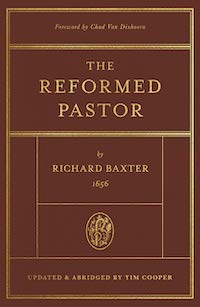 The Reformed Pastor (Updated and Abridged) by Richard Baxter; Adapted by Tim Cooper. “Originally written in 1656 and endorsed by generations of leading pastors as an essential book on the work of ministry, this abridged version of The Reformed Pastor presents the best of Richard Baxter’s timeless advice in simple, modern language that’s more accessible to a new generation of church leaders. In inspiring communications to his fellow ministers, Baxter challenged them to pursue teaching and personal pastoral ministry with an exceptional degree of faithfulness. His words were grounded in the apostle Paul’s encouragement to the leaders in Ephesus to ‘take heed unto yourselves and all the flock.’ Baxter’s advice remains relevant today as Christian leaders face both new and age-old challenges in ministry. With this updated, abridged version of The Reformed Pastor, editor Tim Cooper retains Baxter’s passionate message in a modern, simplified style that speaks clearly to today’s Christian leaders.” (Buy it from Amazon or Westminster Books)
The Reformed Pastor (Updated and Abridged) by Richard Baxter; Adapted by Tim Cooper. “Originally written in 1656 and endorsed by generations of leading pastors as an essential book on the work of ministry, this abridged version of The Reformed Pastor presents the best of Richard Baxter’s timeless advice in simple, modern language that’s more accessible to a new generation of church leaders. In inspiring communications to his fellow ministers, Baxter challenged them to pursue teaching and personal pastoral ministry with an exceptional degree of faithfulness. His words were grounded in the apostle Paul’s encouragement to the leaders in Ephesus to ‘take heed unto yourselves and all the flock.’ Baxter’s advice remains relevant today as Christian leaders face both new and age-old challenges in ministry. With this updated, abridged version of The Reformed Pastor, editor Tim Cooper retains Baxter’s passionate message in a modern, simplified style that speaks clearly to today’s Christian leaders.” (Buy it from Amazon or Westminster Books)
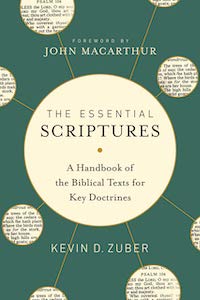 The Essential Scriptures: A Handbook of the Biblical Texts for Key Doctrines by Kevin Zuber. “All good theology is grounded in the Word of God. Yet sometimes it’s hard to keep track of which scriptures support certain doctrines. That’s where The Essential Scriptures comes in. With an easy-to-use handbook format, this reference work moves through the main headings of systematic theology, offering full quotations of the biblical verses that undergird various doctrines. No more jumping back and forth between multiple sources. The Essential Scriptures puts it all in one place, providing not only the biblical support but also a learned exposition of how those passages serve as the basis for the doctrine under discussion.” (Buy it from Amazon or Westminster Books)
The Essential Scriptures: A Handbook of the Biblical Texts for Key Doctrines by Kevin Zuber. “All good theology is grounded in the Word of God. Yet sometimes it’s hard to keep track of which scriptures support certain doctrines. That’s where The Essential Scriptures comes in. With an easy-to-use handbook format, this reference work moves through the main headings of systematic theology, offering full quotations of the biblical verses that undergird various doctrines. No more jumping back and forth between multiple sources. The Essential Scriptures puts it all in one place, providing not only the biblical support but also a learned exposition of how those passages serve as the basis for the doctrine under discussion.” (Buy it from Amazon or Westminster Books)
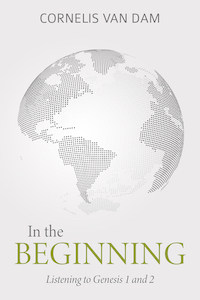 In the Beginning: Listening to Genesis 1 and 2 by Cornelis Van Dam. “Do the opening chapters of Genesis constitute real history? Concerned with an apparent shift among conservative scholars to answer in the negative, Cornelis Van Dam argues that reading Genesis 1 and 2 as history is not only justified but necessary. Van Dam clarifies the different roles that ancient Near Eastern literature and scientific theories should play in our understanding of the Bible as he carefully deals with the exegetical details of the first two chapters of the Bible. Pastors, students, and church leaders will find In the Beginning an informed guide that will restore their confidence in the complete reliability of the Genesis creation account.” (Buy it from Amazon)
In the Beginning: Listening to Genesis 1 and 2 by Cornelis Van Dam. “Do the opening chapters of Genesis constitute real history? Concerned with an apparent shift among conservative scholars to answer in the negative, Cornelis Van Dam argues that reading Genesis 1 and 2 as history is not only justified but necessary. Van Dam clarifies the different roles that ancient Near Eastern literature and scientific theories should play in our understanding of the Bible as he carefully deals with the exegetical details of the first two chapters of the Bible. Pastors, students, and church leaders will find In the Beginning an informed guide that will restore their confidence in the complete reliability of the Genesis creation account.” (Buy it from Amazon)
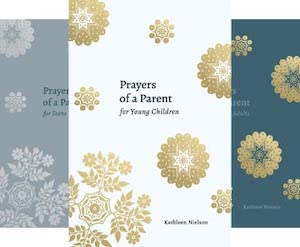 Prayers of a Parent by Kathleen Nielson. This new 4-book series from Kathleen Nielson provides parents with prayers suitable to four different stages of their children’s lives. They are available as a collection or as individual volumes. “Across this four-volume series, beautiful poetic prayers by author Kathleen Nielson address the spiritual well-being, physical needs, and character growth of a child from infancy to adulthood. Designed for parents, each book has 31 prayers, brief reflections, and Scripture selections for meditation.” (Buy them from Amazon or Westminster Books)
Prayers of a Parent by Kathleen Nielson. This new 4-book series from Kathleen Nielson provides parents with prayers suitable to four different stages of their children’s lives. They are available as a collection or as individual volumes. “Across this four-volume series, beautiful poetic prayers by author Kathleen Nielson address the spiritual well-being, physical needs, and character growth of a child from infancy to adulthood. Designed for parents, each book has 31 prayers, brief reflections, and Scripture selections for meditation.” (Buy them from Amazon or Westminster Books)
 Every few weeks I like to share an example of one of our worship services from Grace Fellowship Church. I do so hoping they serve as a model of how one church attempts to worship the Lord in a distinctly biblical way. This service’s cast of characters included Paul as our service leader, Josh as our lead worshipper, Dwight (one of our associate pastors) as the elder who read the Scripture text and prayed. I preached. Our band consisted of two guitars and one piano accompanying one male and one female vocalist. The various elements of the service are in bold with the name of the person who led the element in parentheses. Items in quotes or blockquotes represent roughly what the person said to the congregation. Items not in quotes are explanatory. The entire service took approximately 90 minutes. Welcome & Call to Worship (Josh) Josh began our service by reading Psalm 19:1–2: “The heavens declare the glory of God, and the sky above proclaims his handiwork. Day to day pours out speech, and night to night reveals knowledge.” He then said, “Everything God has made invites you to worship Him today—from the glory of the sun and skies, to the wonder of the smallest bug. All that is made points to the Maker. So why don’t you shut down your electronic devices and open up your hearts. Come and worship our Great Creator.” Singing (Josh) Corporate Reading (Paul) “Let’s practise what we will spend eternity singing!” We then read the words of Revelation…]]>
Every few weeks I like to share an example of one of our worship services from Grace Fellowship Church. I do so hoping they serve as a model of how one church attempts to worship the Lord in a distinctly biblical way. This service’s cast of characters included Paul as our service leader, Josh as our lead worshipper, Dwight (one of our associate pastors) as the elder who read the Scripture text and prayed. I preached. Our band consisted of two guitars and one piano accompanying one male and one female vocalist. The various elements of the service are in bold with the name of the person who led the element in parentheses. Items in quotes or blockquotes represent roughly what the person said to the congregation. Items not in quotes are explanatory. The entire service took approximately 90 minutes. Welcome & Call to Worship (Josh) Josh began our service by reading Psalm 19:1–2: “The heavens declare the glory of God, and the sky above proclaims his handiwork. Day to day pours out speech, and night to night reveals knowledge.” He then said, “Everything God has made invites you to worship Him today—from the glory of the sun and skies, to the wonder of the smallest bug. All that is made points to the Maker. So why don’t you shut down your electronic devices and open up your hearts. Come and worship our Great Creator.” Singing (Josh) Corporate Reading (Paul) “Let’s practise what we will spend eternity singing!” We then read the words of Revelation…]]>
Every few weeks I like to share an example of one of our worship services from Grace Fellowship Church. I do so hoping they serve as a model of how one church attempts to worship the Lord in a distinctly biblical way.
This service’s cast of characters included Paul as our service leader, Josh as our lead worshipper, Dwight (one of our associate pastors) as the elder who read the Scripture text and prayed. I preached. Our band consisted of two guitars and one piano accompanying one male and one female vocalist. The various elements of the service are in bold with the name of the person who led the element in parentheses. Items in quotes or blockquotes represent roughly what the person said to the congregation. Items not in quotes are explanatory. The entire service took approximately 90 minutes.
Welcome & Call to Worship (Josh)
Josh began our service by reading Psalm 19:1–2: “The heavens declare the glory of God, and the sky above proclaims his handiwork. Day to day pours out speech, and night to night reveals knowledge.” He then said, “Everything God has made invites you to worship Him today—from the glory of the sun and skies, to the wonder of the smallest bug. All that is made points to the Maker. So why don’t you shut down your electronic devices and open up your hearts. Come and worship our Great Creator.”
Singing (Josh)
- “Creation Sings the Father’s Song”
Corporate Reading (Paul)
“Let’s practise what we will spend eternity singing!” We then read the words of Revelation 4:11 together: “Worthy are you, our Lord and God, to receive glory and honor and power, for you created all things, and by your will they existed and were created.”
Prayer of Adoration
Paul prayed a brief prayer of adoration.
Singing (Josh)
- “My One Comfort”
- “Grace Alone”
Complementary Scripture Reading (Paul)
Paul read Malachi 2:13-16 as a text that appropriately complemented the text for the sermon.
Prayer of Confession (Paul)
Paul led us in a prayer of confession which confessed our involvement and complicity in the kinds of sins described in the text he had just read.
Singing (Josh)
- “When I Survey the Wondrous Cross”
Scripture Reading (Dwight)
“Please take your Bible and turn to Genesis 1. We will be be reading beginning in verse 26 and continuing into chapter 2. That will be on page 1 if you are using one of our church Bibles.” He began the reading with “This is what Holy Scripture says…” and ended it with “This is the word of the Lord,” to which the congregation replied, “Thanks be to God.”
Pastoral Prayer (Dwight)
Dwight led the pastoral prayer in which he prayed for a number of issues relevant to the life of the church. This prayer was perhaps five minutes in length.
Singing (Josh)
- Psalm 2
Sermon (Tim)
I preached on the theme of The Christian Family, taking Genesis 1-2 as my starting point.
Singing (Josh)
- “O Great God”
Commission (Paul)
Paul commissioned the church to live out the truths we heard in the service and especially in the sermon. This served as a bridge to tell about some of the events and opportunities coming up in the week(s) ahead.
Benediction (Paul)
“Receive this blessing of the Lord from His Word: ‘The grace of the Lord Jesus Christ and the love of God and the fellowship of the Holy Spirit be with you all.’ AMEN.”
]]> It’s not like we’re hurting for books about a Christian understanding of work. In fact, the past few years have seen nothing short of an explosion of interest in the subject. So when yet another showed up in my mailbox, I was tempted to set it aside. I was tempted, that is, until I saw D.A. Carson’s commendation: “The last few years have witnessed a flurry of books that treat a Christian view of work. This is the best of them. Well written, historically comprehensive, theologically informed, exegetically sensitive, this is now the ‘must read’ volume on the subject.” That’s no small praise from a distinguished theologian and voracious reader who once told me he reads several hundred books each year and has maintained that pace for decades. I decided that instead of setting aside Daniel Doriani’s Work, I’d prioritize it. I’m so glad I did. Daniel Doriani is known as a preacher, a seminary professor, and an author of several excellent commentaries. This book may be best understood as a passion project, an area of particular interest for which he has been formulating his thoughts over a long period of time. “In this book,” he says, “I hope to engage all who want to practice love and justice in their work, whether they be professionals or laborers, business leaders or artisans, students, retirees, or stay-at-home parents.” That being the case, he writes especially for two kinds of people. The first kind doubts the value of their labor. When asked about their work, they often…]]>
It’s not like we’re hurting for books about a Christian understanding of work. In fact, the past few years have seen nothing short of an explosion of interest in the subject. So when yet another showed up in my mailbox, I was tempted to set it aside. I was tempted, that is, until I saw D.A. Carson’s commendation: “The last few years have witnessed a flurry of books that treat a Christian view of work. This is the best of them. Well written, historically comprehensive, theologically informed, exegetically sensitive, this is now the ‘must read’ volume on the subject.” That’s no small praise from a distinguished theologian and voracious reader who once told me he reads several hundred books each year and has maintained that pace for decades. I decided that instead of setting aside Daniel Doriani’s Work, I’d prioritize it. I’m so glad I did. Daniel Doriani is known as a preacher, a seminary professor, and an author of several excellent commentaries. This book may be best understood as a passion project, an area of particular interest for which he has been formulating his thoughts over a long period of time. “In this book,” he says, “I hope to engage all who want to practice love and justice in their work, whether they be professionals or laborers, business leaders or artisans, students, retirees, or stay-at-home parents.” That being the case, he writes especially for two kinds of people. The first kind doubts the value of their labor. When asked about their work, they often…]]>
It’s not like we’re hurting for books about a Christian understanding of work. In fact, the past few years have seen nothing short of an explosion of interest in the subject. So when yet another showed up in my mailbox, I was tempted to set it aside. I was tempted, that is, until I saw D.A. Carson’s commendation: “The last few years have witnessed a flurry of books that treat a Christian view of work. This is the best of them. Well written, historically comprehensive, theologically informed, exegetically sensitive, this is now the ‘must read’ volume on the subject.” That’s no small praise from a distinguished theologian and voracious reader who once told me he reads several hundred books each year and has maintained that pace for decades. I decided that instead of setting aside Daniel Doriani’s Work, I’d prioritize it. I’m so glad I did.
Daniel Doriani is known as a preacher, a seminary professor, and an author of several excellent commentaries. This book may be best understood as a passion project, an area of particular interest for which he has been formulating his thoughts over a long period of time. “In this book,” he says, “I hope to engage all who want to practice love and justice in their work, whether they be professionals or laborers, business leaders or artisans, students, retirees, or stay-at-home parents.” That being the case, he writes especially for two kinds of people.
The first kind doubts the value of their labor. When asked about their work, they often begin with two words: “I just.” They say, “I just watch children,” “I just stock shelves,” “I just market clothing,” “I just transport vegetables.” Yes, but anyone who ships vegetables efficiently makes life better for numerous people, many of them poor. That said, I’m no “Your work matters” cheerleader. Indeed, some work is so shoddy and trivial that it barely seems to matter.
I like that, because while he celebrates the value of all legitimate forms of work, he also doesn’t act as if all work is exactly equal—a position we sometimes try to maintain. And then there is the second kind of person.
I also write for a second kind of person, the woman who ardently yearns to do significant work, the man who dares to think his work can change his corner of the world. In this, I join John Calvin, Abraham Kuyper, and their followers as they affirm that Jesus is Lord of every domain, not merely the church. Jesus declares that he rules everything when he says that the kingdom of God has arrived (Matt. 12:28; Luke 11:20). When the Gospels show Jesus working, whether teaching crowds or healing the sick, the physicality of his activity demonstrates that redemption shapes all of life—the body, not just the spirit.
So he doesn’t write only about the jobs we do, but the deeper yearnings we have to bring about reform in areas of passion or vocation.
He begins by laying out twelve principles that form a foundation of a Christian understanding of work—a kind of biblical theology that looks at work from Genesis 1 to Revelation 22 to see what all of scripture has to say about what we do. The opening chapters strengthen this foundation by looking deeper at several of the issues such as the glory and misery of work in a God-created but fallen world, and the restoration of our work through the gospel of Jesus Christ. He also looks at how views of work have changed through time, both within the church and outside of it.
The second part of the book, chapters 5-8, looks to the essential topics of calling, faithfulness, work in difficult places or amid difficult circumstances, and the God-ordained rhythm of work and rest. Two final chapters make up the third part of the book and explore how Christians can (and often should) make efforts to reform the workplace and wider society. Those two chapters “offer a theology or apologetic for the project of attempting to bring reformation through work.” A useful appendix shows how Christians might apply biblical principles to ten common but very different fields of labor, from teachers, to soldiers, to entertainers.
I found the book extremely helpful. Doriani covers some common territory such as that biblical theology of work and that false dichotomy between vocations that are sacred and secular. But he also adds some thought-provoking material about the things we may take for granted in a society dominated by a very utilitarian view of work and workers. He aptly shows how the sometimes cutthroat practices of business in a capitalist context may not be fully compatible with a biblical view of love and justice. He calls for hard work, but also deliberate rest from that work. He calls for us to be generally satisfied in the stations to which God has called us, but also to be willing and perhaps even eager to take opportunities to bring reform. He shows how there is dignity in all legitimate work, but also shows how some forms of work genuinely matter more than others.
Having read this book and benefited from Work, I’m inclined to agree with Carson and to consider it the leading work on the subject. I gladly commend to every Christian.
]]> As you know, I am on vacation this week and am posting only A La Carte articles. Regular articles and videos will resume on Monday. Doctrine Is Inevitable “Many of the writers and spokespeople who talked about prioritizing relationships over doctrine have actually become quite adamant about their own theology. It just so happens that the doctrine that is worth making standards around is just a different kind.” The Music and the Meaning of Male & Female In this long but excellent article (which you can download and print for easier reading, Alastair Roberts helps us to tune in to the theology of gender in Genesis 1 & 2. 3 Bible Passages to Study with Unbelievers Don’t ever doubt the power of the Bible as the primary evangelistic tool. “I love walking through Scripture with people whenever they permit me the time. And there are three passages in particular that I am usually drawn to, depending on the type of questions I receive throughout the conversation. So, here are my top three passages to study with unbelievers.” There’s a Surprisingly Rich Debate About How to Define Death How do you know that someone has died? There is a lot of debate about it and this article lays out some of the approaches. Two Reasons the Trinity Matters “Most of us have retained a formal belief in the Trinity. What we need to recover is an understanding and a felt sense of why it matters so much. To help us do that, here are two reasons…]]>
As you know, I am on vacation this week and am posting only A La Carte articles. Regular articles and videos will resume on Monday. Doctrine Is Inevitable “Many of the writers and spokespeople who talked about prioritizing relationships over doctrine have actually become quite adamant about their own theology. It just so happens that the doctrine that is worth making standards around is just a different kind.” The Music and the Meaning of Male & Female In this long but excellent article (which you can download and print for easier reading, Alastair Roberts helps us to tune in to the theology of gender in Genesis 1 & 2. 3 Bible Passages to Study with Unbelievers Don’t ever doubt the power of the Bible as the primary evangelistic tool. “I love walking through Scripture with people whenever they permit me the time. And there are three passages in particular that I am usually drawn to, depending on the type of questions I receive throughout the conversation. So, here are my top three passages to study with unbelievers.” There’s a Surprisingly Rich Debate About How to Define Death How do you know that someone has died? There is a lot of debate about it and this article lays out some of the approaches. Two Reasons the Trinity Matters “Most of us have retained a formal belief in the Trinity. What we need to recover is an understanding and a felt sense of why it matters so much. To help us do that, here are two reasons…]]>
As you know, I am on vacation this week and am posting only A La Carte articles. Regular articles and videos will resume on Monday.
Doctrine Is Inevitable
“Many of the writers and spokespeople who talked about prioritizing relationships over doctrine have actually become quite adamant about their own theology. It just so happens that the doctrine that is worth making standards around is just a different kind.”
The Music and the Meaning of Male & Female
In this long but excellent article (which you can download and print for easier reading, Alastair Roberts helps us to tune in to the theology of gender in Genesis 1 & 2.
3 Bible Passages to Study with Unbelievers
Don’t ever doubt the power of the Bible as the primary evangelistic tool. “I love walking through Scripture with people whenever they permit me the time. And there are three passages in particular that I am usually drawn to, depending on the type of questions I receive throughout the conversation. So, here are my top three passages to study with unbelievers.”
There’s a Surprisingly Rich Debate About How to Define Death
How do you know that someone has died? There is a lot of debate about it and this article lays out some of the approaches.
Two Reasons the Trinity Matters
“Most of us have retained a formal belief in the Trinity. What we need to recover is an understanding and a felt sense of why it matters so much. To help us do that, here are two reasons why the Trinity matters.”
God Never Forgets His Promises
“As the puritan John Flavel has been so frequently cited as saying, providence is best read like Hebrew, backwards! Only then is it possible to trace the divine hand on the tiller guiding the gospel ship into a safe harbor. No matter how dark things get, His hand is always in control.”
Poor Interpretation Lets Us “Believe” the Bible While Denying What It Actually Says
“Historically, theological liberals denied Scripture, and everyone knew where they stood. But today many so-called evangelicals affirm their belief in Scripture, while attributing meanings to biblical texts that in fact deny what Scripture really says. Hence they “believe every word of the Bible” while actually embracing (and teaching) beliefs that utterly contradict it.”
Flashback: There Is No Better Life
How do we glorify God? I want to list 4 simple ways that you can glorify God today and every day.
]]>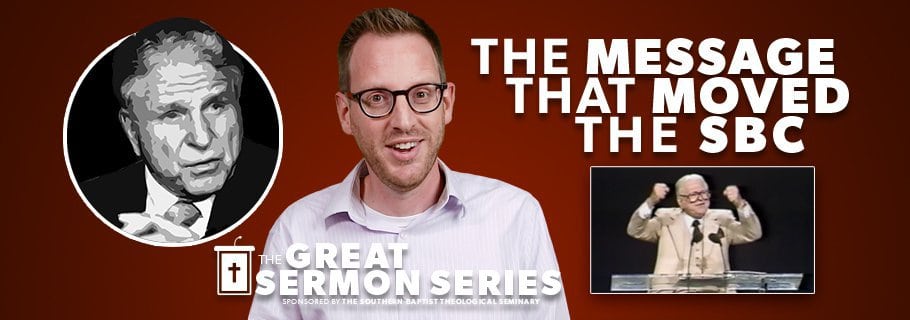 Just a little over thirty years ago, the fate of the SBC hung in the balance. It seemed as though it was going to adapt to the times and embrace theological liberalism, just as countless denominations had done in the U.S.. But at the 1985 SBC Convention in Dallas, Texas, a 75-year-old minister stepped to the podium and decided to take a stand. His message is the next entry in the Great Sermon Series. This video is brought to you in part by the Southern Baptist Theological Seminary. You can download a free book from Southern, and learn more about training for preachers at sbts.edu/challies. Note: In the video I say membership in the SBC is 50 million; that should, of course, be 15 million. (Written by Tim Challies & Joey Schwartz; produced by Thaddeus Maharaj.) Transcript Tim: What Protestant denomination is the largest in the United States and is known for its worldwide reputation for its conservative, inerrant view of the scriptures? You know the answer. With nearly 50 thousand churches and more than 50 million members, the Southern Baptist Convention is this colossal co-operation. And through a time when liberal views of the scriptures were sweeping across America, the SBC managed to hold its roots in the Word of God. Of course, the SBC has certainly not been without its flaws and its blind spots over its 170-year history and yet there is so much to be commended in the convention’s commitment to the scriptures. But this was not always the case. Just…]]>
Just a little over thirty years ago, the fate of the SBC hung in the balance. It seemed as though it was going to adapt to the times and embrace theological liberalism, just as countless denominations had done in the U.S.. But at the 1985 SBC Convention in Dallas, Texas, a 75-year-old minister stepped to the podium and decided to take a stand. His message is the next entry in the Great Sermon Series. This video is brought to you in part by the Southern Baptist Theological Seminary. You can download a free book from Southern, and learn more about training for preachers at sbts.edu/challies. Note: In the video I say membership in the SBC is 50 million; that should, of course, be 15 million. (Written by Tim Challies & Joey Schwartz; produced by Thaddeus Maharaj.) Transcript Tim: What Protestant denomination is the largest in the United States and is known for its worldwide reputation for its conservative, inerrant view of the scriptures? You know the answer. With nearly 50 thousand churches and more than 50 million members, the Southern Baptist Convention is this colossal co-operation. And through a time when liberal views of the scriptures were sweeping across America, the SBC managed to hold its roots in the Word of God. Of course, the SBC has certainly not been without its flaws and its blind spots over its 170-year history and yet there is so much to be commended in the convention’s commitment to the scriptures. But this was not always the case. Just…]]>
Just a little over thirty years ago, the fate of the SBC hung in the balance. It seemed as though it was going to adapt to the times and embrace theological liberalism, just as countless denominations had done in the U.S.. But at the 1985 SBC Convention in Dallas, Texas, a 75-year-old minister stepped to the podium and decided to take a stand. His message is the next entry in the Great Sermon Series.
This video is brought to you in part by the Southern Baptist Theological Seminary. You can download a free book from Southern, and learn more about training for preachers at sbts.edu/challies.
Note: In the video I say membership in the SBC is 50 million; that should, of course, be 15 million.
(Written by Tim Challies & Joey Schwartz; produced by Thaddeus Maharaj.)
Transcript
Tim: What Protestant denomination is the largest in the United States and is known for its worldwide reputation for its conservative, inerrant view of the scriptures? You know the answer. With nearly 50 thousand churches and more than 50 million members, the Southern Baptist Convention is this colossal co-operation. And through a time when liberal views of the scriptures were sweeping across America, the SBC managed to hold its roots in the Word of God. Of course, the SBC has certainly not been without its flaws and its blind spots over its 170-year history and yet there is so much to be commended in the convention’s commitment to the scriptures. But this was not always the case. Just a little over 30 years ago the fate of the SBC really hung in the balance and it seemed as though it was going to adapt to the times and embrace theological liberalism just as countless other denominations had already done. But at the 1985 SBC convention in Dallas, Texas a 75-year-old minister of the Gospel stepped to the podium and took a stand. He would later call this message the most important he had ever delivered.
Criswell: Not in all of my life have I ever prepared an address as minutely and meticulously as I have this one tonight.
Tim: WA Criswell’s message, Whether We Live or Die, put the nail in the coffin of liberalism within the SBC and cemented the direction of the convention for many years to come. What made it such a monumental moment? Let’s take a closer look.
This video is brought to you in part by the Southern Baptist Theological Seminary. You can download a free book from Southern and learn more about training for preachers at sbts.edu/challies.
To grasp the significance of Criswell’s address, you’ve got to go all the way back to 1961. This was the year that Ralph Elliott, a professor at Midwestern Baptist Theological Seminary published The Message of Genesis. By taking a historical, critical approach to the scriptures, he argued that Genesis 1 through 11 was not history but mythology. The publishing of this book sparked what was then called The Genesis Controversy and it ended with Elliott being fired from Midwestern. Eight years later in 1969 the Sunday School Board, that’s a division of the SBC, published The Broadman Bible Commentary. G. Henton Davies had contributed to the first volume on Genesis and he questioned whether God had really told Abraham to sacrifice his son Isaac. Well, there was an uproar amongst Southern Baptists in response to the writings of Elliott and Davies.
The truth was that this critical approach to the scriptures was already rampant within the denomination’s seminaries. And because of this, SBC ministers coming out of the seminaries were carrying this view of the scriptures with them into the churches. Seeing the growth of liberalism in the SBC and it’s threat to a conservative denomination, several SBC leaders, including Criswell, met in 1978 to devise a strategy. They determined to put all of their energy into electing conservative SBC presidents in the years to come. These conservative presidents could then, in turn, nominate conservative leaders for the denomination’s seminaries and its institutions.
From 1979 to 1984 it seemed like their plan was working. By mobilizing thousands of messengers to attend their conventions and vote, they’d managed to push the election of conservative leaders like Adrian Rogers and Bailey Smith and Jimmy Draper, Jnr. But as the 1985 convention approached, opponents of this conservative resurgence, they were called moderates, they gathered all of the resources and all of the messengers they could to that convention. This clash of the 1985 convention lead to the largest turnout in convention history with over 45 thousand messengers gathered to vote and to determine the future of the SBC. This, this was what Criswell stepped into on the night before the convention. It was an all-out battle between the conservatives and the moderates.
Criswell: And the message tonight, entitled Whether We Live or Die, is delivered, prepared in view of the convocation of our assembled messengers beginning in the morning. The outline of the address of the study is this; the pattern of death for a denomination. Then, the pattern of death for an institution. Then, the pattern of death for a preacher, a professor. And then finally, the promise of renaissance and resurrection and revival.
Tim: There are three marks of Criswell’s message that made it particularly powerful and timely and enduring to our day. First, Criswell takes a bold stand for the truth. In light of the impending battle in Dallas the next day, the thousands who gathered to hear Criswell were wondering what his response would be. Would he call for compromise between the two sides? Or would he draw a line in the sand? The moderates didn’t necessarily want the conservatives to embrace their liberal views. They only wanted there to be openness and tolerance within the denomination. So as the conservatives gained power they had to decide whether they too would seek compromise with the moderates. Before the beginning of the sermon Criswell makes his stance clear and to do that, he quotes Charles Spurgeon.
Criswell: He wrote, a chasm is opening between the men who believe their Bible and those who are prepared for an advance upon the scripture. The house is being robbed. Its very walls are being digged down. But the good people who are in bed are too fond of the warmth to go downstairs to meet the burglars. Inspiration and speculation cannot long abide side by side. We cannot hold the inspiration of the Word and yet reject it. We cannot hold the doctrine of the fall and yet talk of evolution of spiritual life from human nature. One or the other must go. Compromise, there can be none.
Tim: Criswell takes a stand for the denomination, saying that if liberalism and higher criticism are welcomed within the SBC they will ruin the denomination. Now some could have accused him of being unloving. Some could have said he was being divisive. But Criswell knew that taking a stand for the truth often divides. And yet this sermon is not marked just by a bold stand for the truth but also a great sorrow over the conflict. And that’s the second key mark of this sermon. He is broken for his opponents. While Criswell unashamedly stands for truth, he doesn’t rebuke the moderate Baptists with a smile. Instead, you can sense a tone of deep sadness and regret throughout his sermon. He wishes that everyone within the denomination could be unified around the Bible. He recounts a story of Lottie Moon, that famous Baptist missionary. She was engaged to Crawford Toy who is a Southern Seminary professor who adopted higher criticism and was eventually dismissed from his position. She returned from China to marry Toy but when she discovered his liberal views, she was forced to leave him and to return to China alone.
Criswell: But Lottie Moon was shattered and grief-stricken by the new theology and liberal beliefs of the man she so deeply admired and so beautifully loved. She returned to China, heartbroken, never to return to a home in America, never to marry, and died there in the Orient, lonely in sole and pouring her very life into a ministry for her starving Chinese people. However much our hearts may yearn over those who are victims and carriers of modernistic fallacy, if we are to survive as a people of God, we must wage a war against the disease that more than any other, will ruin our missionary, evangelistic and sole winning commitment.
Tim: Just as Lottie moon left Crawford Toy, Criswell is saying that the conservatives too must leave behind the moderates. And yet, just as Moon did so with a broken heart, they must be broken hearted over this divisiveness within the SBC. In his message, Criswell displayed not just the rock-solid truth of Christ, but also the tender love of Christ. He shows them how to speak the truth and how to speak it in love.
Finally, the third mark of Criswell’s sermon is this; he is surrounded by a cloud of witnesses. While there were plenty of passionate supporters of the conservative cause, there were also many there who were indifferent. They had a take it or leave it attitude about the state of the SBC. To them, it really made no difference whether moderates were allowed to remain within the denomination and institutions or whether they were removed. So, to convince the apathetic about the urgency of the situation, Criswell zooms out of the SBC for a while and puts the situation in the larger context of the church. He tells them of a similar controversy that Charles Spurgeon had faced within the Baptist Union in England. The union was adopting a liberal view of the scriptures. Instead of agreeing to unite with its fellow Baptists, he decided he needed to take a bold stand because he was convinced that these liberal views within the union would eventually lead to its ruin. Many of his contemporaries believe that Spurgeon was overreacting. Yet as Criswell shows, history proved Spurgeon’s concerns.
Criswell: I was in India years ago when English Baptists were closing down their mission stations on the Ganges River, stations founded by William Carey. Some say the position taken by Spurgeon hurt the mission movement. My brother, if the higher critical approach to the scriptures dominates our institutions and our denomination, there will be no missionaries to hurt, they will cease to exist.
A comment on the sad condition of Baptist churches in England is found in the latest biography of Spurgeon, written by Dr. Arnold Dallimore, entitled, CH Spurgeon, a New Biography, published this last year. The comment concerning English Baptists is this, quote, where there is no acceptance of the Bible as inerrant, there is no true Christianity. The preaching is powerless and what Spurgeon declared to his generation a hundred years ago is the outcome.
Tim: Criswell puts the resurgence in the larger context of the great cloud of witnesses who have fought for the truth before them. By doing this, he shows all of the messengers they cannot be indifferent about liberalism remaining within their denomination. Unless they stand for the truth, there’ll be no SBC to stand for in the coming years. But if they do stand for the truth, they will see a far, far greater result.
Criswell: No battle was ever won by retreat or submission or surrender. When Alexander the Great lay dying, they asked him, whose is the kingdom, and he replied, it is for him who can take it, it will be we or somebody else. Bring me my bow of burning gold, bring me my arrows of desire, bring me my spear, o clouds unfold, bring me my chariot of fire, we shall not cease from battle strife, nor shall the sword sleep in our hand, till we have built Jerusalem in this fair and pleasant land. God grant it, amen.
Tim: Criswell prayed it and God did indeed grant it. Charles Stanley was elected at the 1985 convention solidifying the victory for the conservatives. Over the coming years, conservative leaders were elected for all of the SBC institutions, including the 33-year-old Al Mohler as president of the Southern Baptist Theological Seminary. Criswell’s 40-minute message was an impassioned plea for a return to the Word and this represented a 65-year ministry spent proclaiming the Word. He believed the Bible was a hill on which to die. And the history of the SBC ever since has proved him right. 30 years later, we’re facing the same battles today in the church. Will we tolerate liberalism and a low view of the scriptures? Or like Criswell, will we, even through tears, take a stand on the inerrant Word of God?
If you’re passionate about preaching like I am, I want to tell you about a seminary I’ve grown to trust and appreciate because I know they care deeply about preaching the Word of God. I’d encourage you to visit Southern Seminary which has been under the leadership of Al Mohler for decades now. Southern is absolutely committed to training pastors to know and defend and exposit the precious Word of God. If you visit their site, they’ll give you a free book that can serve as a resource to help you with the kind of bold preaching that we’ve been talking about here today. Simply visit sbts.edu/challies.
]]>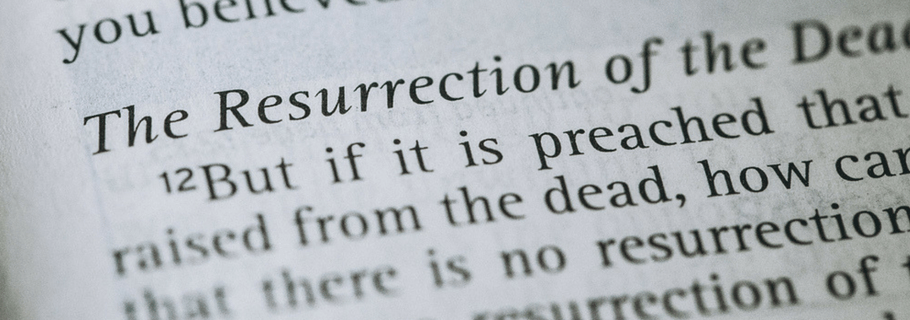 This sponsored post is from Know Why You Believe, an online course taught by K. Scott Oliphint, from Zondervan Academic. If you look at almost any poll about life after death, it will show that the vast majority of people believe in an afterlife. A recent CBS news poll asked more than a thousand adults in America about belief in the afterlife. Three out of four Americans believe in the existence of heaven or hell. When asked where they thought they would spend the afterlife, 82 percent of those polled believed they would spend it in heaven. In light of this overwhelming consensus, books on people who claim to have experiences of heaven do very well. Heaven Is for Real: A Little Boy’s Astounding Story of His Trip to Heaven and Back by Todd Burpo and Lynn Vincent hit No. 1 on the “USA Today’s Best-Selling Books” list and was later made into a movie. What makes books like this so popular? Is it the fact that so many already believe in an afterlife? Or could it be that so many who believe in an afterlife are looking for reasons for their belief? My own suspicion is that many who affirm some kind of existence after death are looking for evidence for that belief. Jeffrey Long, a medical doctor, set out to find empirical evidence for life after death, and he claims to have found it. His book Evidence of the Afterlife spent time on the New York Times bestseller list in 2010. The question…]]>
This sponsored post is from Know Why You Believe, an online course taught by K. Scott Oliphint, from Zondervan Academic. If you look at almost any poll about life after death, it will show that the vast majority of people believe in an afterlife. A recent CBS news poll asked more than a thousand adults in America about belief in the afterlife. Three out of four Americans believe in the existence of heaven or hell. When asked where they thought they would spend the afterlife, 82 percent of those polled believed they would spend it in heaven. In light of this overwhelming consensus, books on people who claim to have experiences of heaven do very well. Heaven Is for Real: A Little Boy’s Astounding Story of His Trip to Heaven and Back by Todd Burpo and Lynn Vincent hit No. 1 on the “USA Today’s Best-Selling Books” list and was later made into a movie. What makes books like this so popular? Is it the fact that so many already believe in an afterlife? Or could it be that so many who believe in an afterlife are looking for reasons for their belief? My own suspicion is that many who affirm some kind of existence after death are looking for evidence for that belief. Jeffrey Long, a medical doctor, set out to find empirical evidence for life after death, and he claims to have found it. His book Evidence of the Afterlife spent time on the New York Times bestseller list in 2010. The question…]]>
This sponsored post is from Know Why You Believe, an online course taught by K. Scott Oliphint, from Zondervan Academic.
If you look at almost any poll about life after death, it will show that the vast majority of people believe in an afterlife. A recent CBS news poll asked more than a thousand adults in America about belief in the afterlife. Three out of four Americans believe in the existence of heaven or hell. When asked where they thought they would spend the afterlife, 82 percent of those polled believed they would spend it in heaven.
In light of this overwhelming consensus, books on people who claim to have experiences of heaven do very well. Heaven Is for Real: A Little Boy’s Astounding Story of His Trip to Heaven and Back by Todd Burpo and Lynn Vincent hit No. 1 on the “USA Today’s Best-Selling Books” list and was later made into a movie.
What makes books like this so popular? Is it the fact that so many already believe in an afterlife? Or could it be that so many who believe in an afterlife are looking for reasons for their belief? My own suspicion is that many who affirm some kind of existence after death are looking for evidence for that belief. Jeffrey Long, a medical doctor, set out to find empirical evidence for life after death, and he claims to have found it. His book Evidence of the Afterlife spent time on the New York Times bestseller list in 2010.
The question of “why” is virtually absent from discussions of our popular belief in the afterlife. We all recognize that there really is no current evidence for life after death. Even Jeffrey Long, in his book, had to admit that the empirical “evidence” that he was able to collect was not evidence of life after death, but of experiences by many people who were “near death.” An experience from people who are near death, even if there are thousands of them that are exactly alike, tells us nothing about what happens after we all die. It only tells us what “near death” patients experience.
Only the Christian position is able to give a full account of what it means to be a person and of what life as a person means. Since most people believe in an afterlife, it might be a good idea to begin with that belief when speaking with people who are skeptical of Christianity.
When we consider the reasons why Christians believe in a future life, we begin at the beginning. When we read about God’s activity of creation in Genesis 1 and 2, we see that the climax of creation was the creation of man and woman in the image of God. For five days, God is simply saying, “Let there be …,” and there was. But on the last day, God takes counsel with himself. In doing so, he is marking the fact that what he is about to create is substantially different from what he has been creating. That difference, as we see in Genesis, is not in the material that God used to create Adam.
Like the animals, Adam was formed “from the dust of the ground.” He was made from the same “stuff” as the animals. The difference for Adam (and, from him, Eve)—and it is a remarkable and profound difference—is that once God formed Adam from the dust of the ground, he “breathed into his nostrils the breath of life.” We also learn that, because it was not good for Adam to be alone, God formed Eve from Adam, so that both of them were, in their creation, made as the image of God.
God created Adam in his image and, unlike the rest of creation, God breathed into Adam the breath of life. Humans bear the image of God and are given the breath of life—what nothing else in creation was given.
We also find out from Scripture that there is a stark division between those who die in Christ and are in fellowship with God, and those who don’t. Jesus spoke of a man who died and was with Abraham, and another man who died but was in torment. In both cases, because each man was made in God’s image, existence continues into eternity. For those who die in Christ, existence continues in him and with God. For those who die in their sins, existence continues, but it consists of nothing but eternal torment.
It is clear from Scripture that “image of God” includes an inbreathed life, an inbreathed character that is distinct from everything else in creation. It is distinct, centrally, in that it implies a relationship with God for eternity that ends either in eternal fellowship with him or in eternal torment under his wrath. The difference has to do with one’s relationship to Christ. But in each and every case, human beings continue to exist beyond death. One either exists eternally with Christ, under God’s grace, or one exists eternally in torment, under God’s wrath. Once we begin to exist, the “life principle” that makes us “image of God” guarantees our eternal existence.
Existence after death is a fact of life. A majority of people believe it. The only real reason to believe it, however, is given to us in the Christian faith. Because God created people as his image, and thus breathed life into them, their existence will never cease.
But existence after death is different from life after death. Life after death is found only in Christ. Without Christ, existence after death, though eternal, is called a “second death.” Without these Christian truths, the best answer one has to the “why” question of life after death is “just because.”
To learn more about the basics of Christian belief, sign up for Know Why You Believe, an online course taught by K. Scott Oliphint. Take a look at the free preview video:
]]>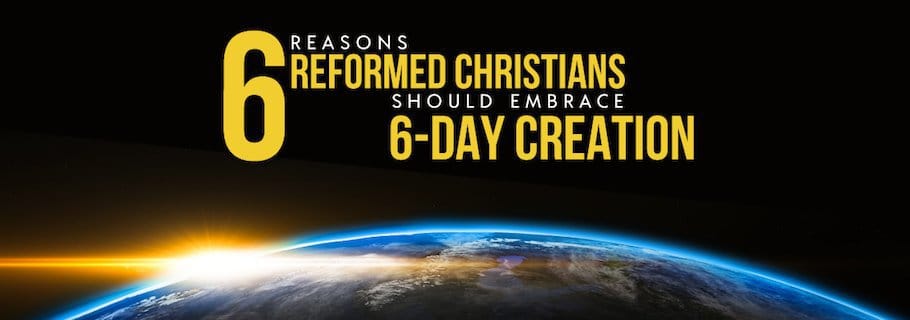 This sponsored post was prepared by Director Thomas Purifoy Jr. on behalf of Is Genesis History?. When Is Genesis History? opened in theaters last year, we had no idea it would be the top-grossing Christian documentary for 2017. We were even more surprised when our distributor said it was bringing it for an Anniversary Event. Why did this film resonate so much with audiences? Perhaps it demonstrated that it’s intellectually reasonable for Christians to embrace 6-day creation. By ‘6-day creation,’ I’m referring not just to one’s view of Genesis 1, but to an entire chronology of historical events. These include the immediate creation of everything in six normal days, a Fall that brought corruption and death into the universe, and a global Flood that destroyed the world. I recognize that among some Reformed Christians this is not a popular view of history. Instead, some have adopted the framework hypothesis, analogical days, or the cosmic-temple model to interpret Genesis 1. They then accept the conventional chronology of universal history. This includes the slow formation of everything over billions of years starting with a Big Bang, the corruption, and death of trillions of creatures before the arrival of Adam and Eve, a Fall that introduced death only to mankind, and a local flood during the days of Noah. I realize that intelligent and godly Reformed Christians hold to this model of Earth history. Nevertheless, many seem unaware of the actual events they must inevitably adopt when affirming a 13.8 billion-year-old universe. After all, one cannot extend history…]]>
This sponsored post was prepared by Director Thomas Purifoy Jr. on behalf of Is Genesis History?. When Is Genesis History? opened in theaters last year, we had no idea it would be the top-grossing Christian documentary for 2017. We were even more surprised when our distributor said it was bringing it for an Anniversary Event. Why did this film resonate so much with audiences? Perhaps it demonstrated that it’s intellectually reasonable for Christians to embrace 6-day creation. By ‘6-day creation,’ I’m referring not just to one’s view of Genesis 1, but to an entire chronology of historical events. These include the immediate creation of everything in six normal days, a Fall that brought corruption and death into the universe, and a global Flood that destroyed the world. I recognize that among some Reformed Christians this is not a popular view of history. Instead, some have adopted the framework hypothesis, analogical days, or the cosmic-temple model to interpret Genesis 1. They then accept the conventional chronology of universal history. This includes the slow formation of everything over billions of years starting with a Big Bang, the corruption, and death of trillions of creatures before the arrival of Adam and Eve, a Fall that introduced death only to mankind, and a local flood during the days of Noah. I realize that intelligent and godly Reformed Christians hold to this model of Earth history. Nevertheless, many seem unaware of the actual events they must inevitably adopt when affirming a 13.8 billion-year-old universe. After all, one cannot extend history…]]>
This sponsored post was prepared by Director Thomas Purifoy Jr. on behalf of Is Genesis History?.
When Is Genesis History? opened in theaters last year, we had no idea it would be the top-grossing Christian documentary for 2017. We were even more surprised when our distributor said it was bringing it for an Anniversary Event.
Why did this film resonate so much with audiences? Perhaps it demonstrated that it’s intellectually reasonable for Christians to embrace 6-day creation.
By ‘6-day creation,’ I’m referring not just to one’s view of Genesis 1, but to an entire chronology of historical events. These include the immediate creation of everything in six normal days, a Fall that brought corruption and death into the universe, and a global Flood that destroyed the world. I recognize that among some Reformed Christians this is not a popular view of history. Instead, some have adopted the framework hypothesis, analogical days, or the cosmic-temple model to interpret Genesis 1.
They then accept the conventional chronology of universal history. This includes the slow formation of everything over billions of years starting with a Big Bang, the corruption, and death of trillions of creatures before the arrival of Adam and Eve, a Fall that introduced death only to mankind, and a local flood during the days of Noah.
I realize that intelligent and godly Reformed Christians hold to this model of Earth history. Nevertheless, many seem unaware of the actual events they must inevitably adopt when affirming a 13.8 billion-year-old universe. After all, one cannot extend history for billions of years without attaching new events to it. Those events have theological consequences. This is why Reformed thinkers like Geerhardus Vos, Louis Berkhof, and D. Martin Lloyd-Jones embraced 6-day creation. They understood it is the events included in 6-day creation that are essential for Christian theology.
Here are six theological reasons worth considering:
1. God’s Goodness Must Be Reflected in the Original Creation
Ligon Duncan observed in an interview for ‘The Gospel Coalition’ that affirming the goodness of the original creation is non-negotiable. As the Westminster Confession states, the goodness of the original creation is the manifestation of the glory of God’s own goodness. (WCF 4.1)
What does that goodness look like? It is full of life-giving power and bounty. This is what we see in Genesis 1. God pronounces His original creation ‘good’ and ‘very good.’ It was a world of plenty and beauty without animal carnivory (Gen 1:30) and without corruption and death (Rom 8:21).
Yet this picture of an artistically-designed, beautiful world only fits within the chronology of 6-day creation. If one adopts the conventional chronology, one must accept that the Earth was absent from the universe for its first 9 billion years. After a galactic cooling event, the Earth slowly formed through billions of years of uninhabitable environments. God eventually created the first complex marine life, then progressively created or evolved different types of organisms. These experienced death and massive extinction events that led to the destruction of trillions of living creatures. All this happened long before the appearance of Adam and Eve.
I realize that some Christians may not be interested in these sorts of details. Yet anyone who chooses to accept an old universe implicitly accepts the historical events that go with it. It is a history filled with lifelessness and death, not the goodness of God.
2. Adam’s Sin Resulted in Universal Corruption and Death
According to the conventional chronology, corruption has always been a part of the universe. This can be seen in the fossil record which supposedly represents 540 million years of animal suffering and death. It provides snapshots of a world often full of thorns and thistles.
In this view, Adam’s sin could not have been the ultimate cause of universal corruption. As a historical event, his disobedience occurred long after corruption was present. But according to 6-day creation, Adam’s sin precedes God’s curse on the creation. The suffering and death of animals came as a result of Adam’s disobedience, not prior to it. Thorns and thistles were a part of the curse, not before it.
This is what Paul affirms in Romans 8:21. It is what Reformed theology has always affirmed: Adam was given dominion over the entire creation at the beginning; when he sinned, the entire creation was subjected to corruption as a consequence of its unique relationship to him.
3. The Pattern of Creation/Fall/Redemption Culminates in the New Creation
If the universe contained death and corruption that wasn’t the result of Adam’s sin, what does that mean for Jesus’s redemption of both man and creation?
Consider His miracles: He was re-forming the world according to the goodness of the original creation. Whether Jesus was healing the sick, raising the dead, or feeding the hungry, He was showing that redemption results in tangible bounty to actual people. It is a goodness that culminates with the new creation. Passages in the Prophets and Revelation suggest a return to the space-time goodness of the original creation.
Yet it is only the chronology of 6-day creation that provides the historical framework for this pattern to have meaning. If the original creation was not good, or if the Fall did not transform that creation into something evil, then what is the real nature of our redemption? And what is the real potential of the new creation? For the bookends of creation to match, they must be mirrors of each other. This is only possible with 6-day creation.
4. Scripture Must be Used to Interpret Scripture
In the Odyssey, when Penelope wants to prove her husband’s identity, she requests he shoot an arrow through 12 axe handles placed in a row. She knows he is the only one who can do it. In the same way, although different interpretations claim to be accurate, only those which pass intact through the entirety of the Bible are true. This is what we see with the events associated with 6-day creation: they are affirmed throughout the entire Bible.
Whether it is Moses connecting creation week with a normal week in the fourth commandment; or Isaiah affirming God created man at the same time He created the heavens and the earth; or Jesus explaining the global destruction of the Flood in light of His second coming; or Luke tracing the history of the world through a single genealogy; or Paul relating the work of Adam to the work of Christ; or Peter showing the relationship between the creation, global flood, and judgment to come, there is only one historical sequence that consistently fits: 6-day creation.
5. Essential Doctrines are Related to History
Last year, I had lunch with a friend who takes a more liberal view of the Bible. As he heard what was in the film, he said, “if there really was a global flood, that changes everything.” This is similar to the line of thinking we see in Acts: if a man really rose from the dead, that changes everything. Paul establishes the necessary connection between the events of history and Christian doctrine in 1 Corinthians 15. Peter does the same in 2 Peter 3 with creation, the flood, and the final judgment. Yet it is only within the historical framework of 6-day creation that all these events cohere to the fabric of time.
For instance, if the thick fossil-bearing rock layers are the result of a global flood, they are a physical reminder of God’s global judgment on the earth in the past—as well as in the future. If, however, one adopts the conventional chronology, those huge layers are merely a testimony to millions of years. God’s judgment is erased from the earth—and perhaps overlooked in the future.
6. Presuppositional Thinking Helps Us Understand the Discipline of Science
Finally, what about science itself? When I started researching our documentary, I came across a book entitled The Structure of Scientific Revolutions by Thomas Kuhn. Although there is much that could be said about Kuhn, his method is easy for Reformed Christians to grasp: he applies presuppositional thinking to the discipline of science. Anyone who has read Van Til can see the similarities between them:
Both point out that data is not “value-neutral,” but that people bring a ‘set of glasses’ toward the interpretation of the world around them. Both recognize the intense commitment people have toward certain views to the exclusion of all others. Both note that groups consistently interpret what they observe in light of their base presuppositions. Now what makes Kuhn interesting is that he explores the history of science in light of this thinking. The result is that he effectively questions the absolute epistemological authority of modern science.
Again, this should not surprise Reformed Christians – we are well aware of the implications of presuppositional thinking. But I would hope it would give Reformed Christians pause who seem to place an enormous amount of trust in the latest ideas of scientists concerning the conventional history of the world — a history which happened long before any of them even existed. As Isaiah might remind us, “Stop regarding man in whose nostrils is breath, for of what account is he?” (Isaiah 2:22, ESV)
In Closing
I regret the abbreviated nature of these thoughts. They are only a few of the many I arrived at during my three-year process researching this film. I have explored them at greater depth in the Is Genesis History? Bible Study that accompanies the film.
In closing, it is my strongest conviction as a Reformed Christian that 6-day creation is the only longterm viable option for Reformed theology. As D. Martin Lloyd-Jones said, “I have no gospel unless Genesis is history.”
If you’ve not yet seen Is Genesis History?, you can find out ways to watch it at IsGenesisHistory.com.
]]> I get letters! I write articles and some people take the time to respond with letters to the editor. Here is another batch of those letters. Letters on Learning to Be Rich To bolster your argument, this happened to me: When having a will produced before returning to the mission field, the lawyer casually but non-mean spiritedly commented that we were dirt poor missionaries. Then we got on the plane and in less than 24 hours we were transformed into filthy rich missionaries. No one gave us money on the plane. It’s all in your perspective. —Bill, St. Louis, MO Letters on Christian Men and Their Video Games Thanks for advocating self-control and correct priorities in connection with video games. However, after reading The Shallows: What the Internet Is Doing to Our Brains, by Nicholas Carr, I would disagree that reading, fishing, and crocheting are the same as gaming. The alterations in the physical structure of the brain, and the decrease in ability to give deep attention, does not make video gaming the same as the other activities mentioned, or even the same as non-digital games like chess, checkers or parcheesi. While video games are probably an acceptable form of entertainment for Christians, it does not seem accurate to classify them as the same as other non-digital forms of entertainment which promote brain rest. —Lois S, Wichita, KS I’ve worked in the gaming industry as a Christian since 2013 and have found it a difficult balance at times to live out my faith among my…]]>
I get letters! I write articles and some people take the time to respond with letters to the editor. Here is another batch of those letters. Letters on Learning to Be Rich To bolster your argument, this happened to me: When having a will produced before returning to the mission field, the lawyer casually but non-mean spiritedly commented that we were dirt poor missionaries. Then we got on the plane and in less than 24 hours we were transformed into filthy rich missionaries. No one gave us money on the plane. It’s all in your perspective. —Bill, St. Louis, MO Letters on Christian Men and Their Video Games Thanks for advocating self-control and correct priorities in connection with video games. However, after reading The Shallows: What the Internet Is Doing to Our Brains, by Nicholas Carr, I would disagree that reading, fishing, and crocheting are the same as gaming. The alterations in the physical structure of the brain, and the decrease in ability to give deep attention, does not make video gaming the same as the other activities mentioned, or even the same as non-digital games like chess, checkers or parcheesi. While video games are probably an acceptable form of entertainment for Christians, it does not seem accurate to classify them as the same as other non-digital forms of entertainment which promote brain rest. —Lois S, Wichita, KS I’ve worked in the gaming industry as a Christian since 2013 and have found it a difficult balance at times to live out my faith among my…]]>
I get letters! I write articles and some people take the time to respond with letters to the editor. Here is another batch of those letters.
Letters on Learning to Be Rich
To bolster your argument, this happened to me: When having a will produced before returning to the mission field, the lawyer casually but non-mean spiritedly commented that we were dirt poor missionaries. Then we got on the plane and in less than 24 hours we were transformed into filthy rich missionaries. No one gave us money on the plane. It’s all in your perspective.
—Bill, St. Louis, MO
Letters on Christian Men and Their Video Games
Thanks for advocating self-control and correct priorities in connection with video games. However, after reading The Shallows: What the Internet Is Doing to Our Brains, by Nicholas Carr, I would disagree that reading, fishing, and crocheting are the same as gaming. The alterations in the physical structure of the brain, and the decrease in ability to give deep attention, does not make video gaming the same as the other activities mentioned, or even the same as non-digital games like chess, checkers or parcheesi. While video games are probably an acceptable form of entertainment for Christians, it does not seem accurate to classify them as the same as other non-digital forms of entertainment which promote brain rest.
—Lois S, Wichita, KS
I’ve worked in the gaming industry as a Christian since 2013 and have found it a difficult balance at times to live out my faith among my fellow believers. As you wrote so wonderfully, there are some seriously cheap shots that have been taken at those involved in gaming. Thank you for a good reminder today about living as Christ has called us, in all of our spheres of influence, including entertainment.
—Jacob T, St. Louis, MO
Letters on Why Does the Universe Look So Old
I was HUGELY blessed to have Dr. Barrick teach me Genesis 1-3 in Hebrew class at The Master’s Seminary. First, he went through Gen. 1 verse-by-verse, in Hebrew, block-diagrammed to show that the structure is SO profound, and context SO clear, and grammar SO precise, that you can’t change the literal interpretation of Gen. 1 without simply denying what it says. Based on his class, I’ve taught Gen. 1-2 several times. I agree fully with what you wrote. To explain age, I use Actual, Apparent, and Accelerated.
There’s the Actual based on Scripture: 6 day literal creation and thousands of years since. There’s Apparent age like you described with Adam and Eve, plants, and animals having no “history” of birth, youth, etc. (i.e. God willing to create as-is young adults with an apparent age, yet instantly created at that age). Plus, light created in transit, earth created instantly, not from dust/rock accumulation, etc. Then, apply the fall and God left us a world whole, with apparent age and Christians needing to live by faith in this area, as in all areas of life. Just another place we ignore the wisdom of the world because we know what God really did. I mention Accelerated age because many creation “scientists” argue this. They argue the speed of light was faster and then slowed down. But, literally everything about creation would have had to be “accelerated” (star formation, universe expansion, planet formation, star explosions, etc.) and that is both inconsistent with the Gen. 1 narrative and they can’t explain it. Their simple model deals with light. Actual, Apparent, and Accelerated have been the ways that I’ve explained the obvious, honest questions that arise because the Bible and “science” don’t agree.
—Bill V, Auburn, Ca.
Letters on The End of the World As We Know It: An Infographic
I think two things might improve the ammillennial chart.
—Andrew, Canberra, AU
1. The tribulation in now (rather than ‘the tribulation is symbolic’ which makes it sound like it isn’t real)
2. The millennium is purely heavenly in nature (rather than ‘is purely spiritual in nature’). A major difference between the views is whether an earthly and heavenly millennium is in view.
I think these two things might make an excellent chart even better.
Letters on Why We Must Emphasize A Pastor’s Character Over His Skill
I agree with your thesis but my concern comes from the fact that we have so many men of character leading failing churches. Character is not enough. Jesus calls us to “be as shrewd as snakes and as innocent as doves.” In today’s post-Christendom world those who are simply innocent doves are falling from the sky.
There are many definitions of shrewd but I prefer one of the several provided by the Merriam-Webster Dictionary – “marked by clever discerning awareness and hardheaded acumen”. Today’s pastors need to marked by this definition of shrewd.
—Steve D, Loveland, CO
Tim: But does the Bible say that? It is quite clear on the character of an elder, and I don’t see “shrewd” listed.
Letters on There are 3 Kinds of Churches
I really appreciated what you had to say regarding the shift towards commuter churches. Years ago, our family moved from another suburb to be within walking distance to a local church. We saw a value in being able to walk to church and wanted to have a home that was close by, as a way to offer it for hospitality opportunities, etc.
Well, our church shifted over the years, and began to morph into something with which we no longer felt comfortable. So began our “church-search”. After looking at several churches near and far, we felt a call to join one that most resembled church #3 in your ‘Three types of churches’ article. Only problem? It was a 25 minute drive. As we wrestled with this issue, we had a very clarifying discussion about what were deal-makers and deal-breakers in this decision and, when it came down to it, we understood that the people and the preaching of the Word (not necessarily in that order) were far more important to us than programs or proximity. So, we left our comfortable, neighborhood church, because, in the end, we understood that those two things are worth the drive.
The pastor of our new church has worked with the “commuter” demographics by organizing parish-model community groups that meet during the week. So, really it’s the best of both worlds now.
I look forward to the future articles you will write on this topic.
Letters on What’s the Purpose of … the Church?
While I agree with your three conclusions on the purpose of a church in relation to the glory of God, I find it rather upsetting that you need to condemn other circles for their apparent focus. I could not help sensing a measure of pride in your words, that somehow you have figured out the exact way that church is to be conducted. I run into this all the time and find it nauseating. You basically contradict yourself completely in mentioning that one church has a focus in winning the lost and another in discipleship, and then state the same in your assessment of what a church should be.
You seem to assume or indicate that Rick Warren is doing what he’s doing not for God’s glory. I am quite conservative in a lot of ways but also realize that each church family is unique and special. Each placed by God, where they are for the time God allows, and it is not for me to criticize how they seek to glorify God. As long as they are doing that. From my understanding Rick has seen thousands of souls won for the kingdom, and I believe the Apostle Paul would be rejoicing according to Philippians 1. If one church has focus of soul-winning, and another is more focused on discipleship, and both hopefully on worship, why do I (or in this case you,) need to be so critical about it? I trust God will continue to use you in this way of writing, and bless the church that you pastor. We all need to encourage each other.
—Bryan, Toronto, ON
Letters on 7 False Teachers in the Church Today
I just want to point out it’s pretty jarring that in a list of obvious “bad guys,” you name one of them “The Prophet” which is a title that should be held in honor among the people of God, given it’s rich and glorious biblical history. “The Prophet” led and helped and nourished the people of God from Genesis to the end of the 1st century. Also, while I reject the idea that anyone today can claim the same prophetic status held by men such as Moses, Isaiah, Paul or Peter, it is easy to see from the NT that some men and women still bear the title despite (I think) being of a lesser sort. It’s interesting to me that when you discuss Scripture under this heading you appeal to at least one text which speaks not of “The Prophet,” but of False Prophets; do you think it might be important to appreciate that distinction? Is it really a good idea to list the title Prophet alongside such titles as Charlatan, Heretic, Abuser, etc? If you had entitled this category False Prophet I would have no problem, but I think you have done wrong here.
—Dave W, Texarkana, AR
Letters on ‘Tis a Point I Long to Know
]]>The poem you shared does tremendous honour to the “now and not yet” of the kingdom in us. It is a helpful poem. I would like to send you one of my poems, if only for your own edification/enjoyment. On the cusp of decisions with far-reaching consequences, I wrote this to my Lord. It is comprised of quick-rhyming couplets, a stable scheme with slight instability around the middle.
To the one who said, “Let there be light”,
who made the mud and gave us sight,
I pray to ask for wisdom here:
that dark unknowns would be made clear;
that, hearing, I would walk in faith
in any circumstance and place;
that gods called consequence would fail
to rock me, plunge me, drain my sail –
but rather, independent of
these earthly prompters of my love
let God be worshippéd by mewhose eyes were opened, Him to see.
—Joe Spring, Johannesburg, South Africa
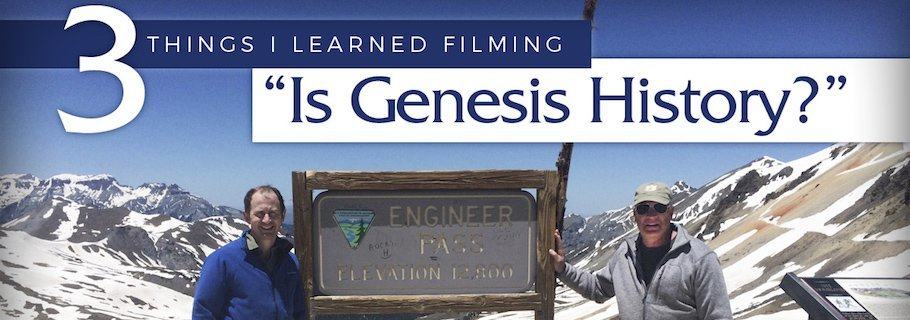 This sponsored post is provided by Thomas Purifoy Jr on behalf of Is Genesis History. Today the full documentary releases on streaming, download, & DVD at IsGenesisHistory.com. This post was written by the producer, writer, and director; at the end of it, he’s provided a look at the first fourteen minutes of the film. The idea for a documentary on Genesis came from a conversation I had with my then 10-year-old daughter. She was watching a creation-evolution debate and was bothered by things the evolutionist said. Her concern was that the events he described — a billions-of-years old earth, the direct relationship of men and animals, a local flood — were completely different from the events described in Genesis. I knew how she felt. As a 15-year-old, I was bothered by the same things and spent a lot of time studying them. Unfortunately, I had forgotten most of it. So I started reading books and articles. I tracked down a few scientists. Eventually, I found myself in front of them with a camera. What I learned over the next three years changed my view of science, history, and the Bible. Here are three of the most important things I learned: Time & History Are the Bedrock of Biblical Theology I cut my theological teeth on the writings of Geerhardus Vos. What he taught me was that God formed real people and events in time to be the foundation of every aspect of Christian theology. God then recorded that history in the Bible. Starting with Creation…]]>
This sponsored post is provided by Thomas Purifoy Jr on behalf of Is Genesis History. Today the full documentary releases on streaming, download, & DVD at IsGenesisHistory.com. This post was written by the producer, writer, and director; at the end of it, he’s provided a look at the first fourteen minutes of the film. The idea for a documentary on Genesis came from a conversation I had with my then 10-year-old daughter. She was watching a creation-evolution debate and was bothered by things the evolutionist said. Her concern was that the events he described — a billions-of-years old earth, the direct relationship of men and animals, a local flood — were completely different from the events described in Genesis. I knew how she felt. As a 15-year-old, I was bothered by the same things and spent a lot of time studying them. Unfortunately, I had forgotten most of it. So I started reading books and articles. I tracked down a few scientists. Eventually, I found myself in front of them with a camera. What I learned over the next three years changed my view of science, history, and the Bible. Here are three of the most important things I learned: Time & History Are the Bedrock of Biblical Theology I cut my theological teeth on the writings of Geerhardus Vos. What he taught me was that God formed real people and events in time to be the foundation of every aspect of Christian theology. God then recorded that history in the Bible. Starting with Creation…]]>
This sponsored post is provided by Thomas Purifoy Jr on behalf of Is Genesis History. Today the full documentary releases on streaming, download, & DVD at IsGenesisHistory.com. This post was written by the producer, writer, and director; at the end of it, he’s provided a look at the first fourteen minutes of the film.
The idea for a documentary on Genesis came from a conversation I had with my then 10-year-old daughter. She was watching a creation-evolution debate and was bothered by things the evolutionist said. Her concern was that the events he described — a billions-of-years old earth, the direct relationship of men and animals, a local flood — were completely different from the events described in Genesis.
I knew how she felt. As a 15-year-old, I was bothered by the same things and spent a lot of time studying them. Unfortunately, I had forgotten most of it. So I started reading books and articles. I tracked down a few scientists. Eventually, I found myself in front of them with a camera.
What I learned over the next three years changed my view of science, history, and the Bible. Here are three of the most important things I learned:
Time & History Are the Bedrock of Biblical Theology
I cut my theological teeth on the writings of Geerhardus Vos. What he taught me was that God formed real people and events in time to be the foundation of every aspect of Christian theology. God then recorded that history in the Bible. Starting with Creation and the Flood and going up to the Apostles, God progressively revealed Himself in the history of the world.
As Vos explains in Biblical Theology, “The process of revelation is not only concomitant with history, but it becomes incarnate in history. The facts of history themselves acquire a revealing significance.”
We sometimes get caught up in our dedication to systematics and forget that every author of the New Testament builds his theology on the historical actions of God in time. Not ‘special, holy’ time, but normal, mundane time: the same days, weeks, months, and years we all experience.
The authors of the Bible make this abundantly clear. The creation happened over six days; the Flood started in Noah’s six hundredth year; Abraham was seventy-five when God called him; Moses spent 40 years in the desert; Isaiah saw the Lord in the year King Uzziah died; Jesus was in the tomb for three days.
All of Christian theology rests on its view of time. That’s why a comment made by an evangelical old-earth creationist intrigued me. He said he began to understand Genesis 1 when he realized it had nothing to do with time. He was referring to a text that uses the words ‘day, evening, and morning’ multiple times in sequence; Moses refers to in Exodus as the pattern for our normal week of work and rest.
To say it has nothing to do with time is a dangerous line of thought. Yet that is what some Christians are doing today. They employ a de-historicizing interpretive process in which events recorded in Scripture are cut free from actual history. The words may still be there, but any connection to normal, mundane time is gone.
George Grant explains the results of this in the film: “When you rid the book of Genesis of its historical moorings, you have suddenly decapitated the whole structure of the Bible.”
This is exactly what recent interpretive methods like the framework hypothesis, analogical days, or the cosmic temple model do: they de-historicize key sections of the text in order to make room for a completely different view of history.
But what is the view of history they are making room for?
The Essential Conflict Is between Two Competing Histories of the World: Deep Time vs. Biblical Time
In 1830, geologist Charles Lyell wrote to a friend hoping his writings would help “free science from Moses.” Lyell and other thinkers rightly understood that Christian theology is rooted in history. If Enlightenment naturalism was to take root, they had to construct an alternate history in which it could flourish.
That history was deep time.
This was an intentional move by brilliant men who had one thing in common: they rejected the possibility of divine revelation. Buffon, LaPlace, and Lamarck were probably atheists; Cuvier, Hutton, and Lyell were deists. Although some of them talked about “design,” they were not referring to the creative actions of the God recorded in Scripture.
They were not alone. The concept of deep time was supported by Anglican “broad churchmen” like Sedgwick, Conybeare, and Buckland who had adopted liberal views in regard to Genesis. From inside the church, they argued Genesis was not actual history. Together, they established a new view of time under the auspices of the scientific thought of their day.
It was the age of rationalism, so scientific ideas self-consciously came before observation. In Time’s Arrow, Time’s Cycle, evolutionist Stephen J. Gould exposes the myth that men like Hutton and Lyell went to the data and then came back with deep time; rather, they started with the concept of long ages and looked for data that would fit their theories. We should therefore not be surprised that many of their interpretations of the rocks have now been discarded—yet their view of time has remained.
After all, it was designed to displace the biblical view of history. This is what has been missed by many in the origins debate: it is not philosophical ideas or scientific data that are ultimate, but the historical framework. Time influences everything else.
But isn’t deep time proven beyond a doubt?
No, it cannot be proven because it is an historical assumption—a paradigm—that precedes the interpretation of data. No one can do an experiment on the past; one can only collect a limited number of observations then attempt to interpret them according to a paradigm. The problem is, those interpretations change.
In just the last 250 years of geology, catastrophism gave way to uniformitarianism which gave way to neo-catastrophism. Geologists now look at rock layers and see evidence of catastrophes separated by long periods of slow geological change, although previous generations would have scoffed at the idea of significant catastrophes to explain layers — just like they scoffed at the idea that the earth had moving plates when in 1859 it was suggested by a creationist. I recently read one graduate-level geology text that shows three different ways the same group of rocks have been interpreted within the last century.
When you dig into the history of science, all you see is change — except in the commitment to deep time. It precedes the data.
This brings me to the basic dichotomy of the film: two competing views of history based on different historical paradigms. One of the oft-heard complaints is that the film presents a false dichotomy. Some have said I have not accurately shown all possible views since I exclude those Christians who think the earth was designed over billions of years by the God of the Bible.
I did not exclude them; I merely grouped them with their primary historical commitment.
We are talking about two radically different histories. Genesis says the universe was created in six normal days with the earth, water, light, land, trees, stars, animals, and people appearing suddenly in a unique order.
The conventional view says the universe formed slowly over 9 billion years; there was a cooling event and the earth and solar system formed; after another billion years, single-cell creatures appeared, then complex creatures a few billion years later. Death and extinction then reigned for hundreds of millions of years before the first humans appear on the earth.
These events are agreed on by everyone, Christian or not, who accepts the current view of deep time. Where there is disagreement, however, is on ultimate causes and the source of life.
When Paul Nelson talks about deep time in the film, he says “all the complexity in life has to be built bottom up by strictly physical processes where no mind, no creator, no design is present.” I realize that some Christians do not like this statement, but I think it accurately represents the current view of deep time: from the Enlightenment to today, there has been a rejection of the Mind, Creator, and Designer revealed in Genesis.
This puts Christians who hold to an old earth in a curious situation. Because they have de-historicized six-day creation and a global flood, they must turn to the naturalistic paradigm to explain what happened during 99.99% of the universe’s history. That’s basically everything.
Yet the primary architects of that history constructed it in direct opposition to the record in Genesis. They do not think the facts of history have any revealing significance. There is no evidence of God speaking. It is just a 13.7 billion year silence.
When Christians then say God must be somewhere in those events that occurred over millions and billions of years, atheists and deists can simply ask, “Where? He certainly hasn’t revealed himself in any knowable way, and that’s the foundation of your biblical theology. Long ago, you helped us discredit the only witness you had.”
That is why the first chapters of Genesis are so important. Paul Nelson explains: “We have a witness to those events, and that witness is telling us this is what happened, and we have to take that into consideration when we evaluate the data.”
That is what the scientists I interviewed are doing. They are taking the historical witness recorded in Genesis and examining the world in light of it.
The Historical Record in Genesis Provides a Much Better Explanation of What We See in the World Around Us
That’s what I found so amazing.
When you look at the complex interrelationships between the countless biological, geological, and physical systems in the world—all of which must simultaneously be in place to work, from genetics to animals to ecosystems to planets—the creation of everything in six, literal days makes perfect sense.
When you look at the enormous layers of rock that stretch across huge sections of the continent, the lack of widespread erosion between layers, the sudden appearance of complex fossils in the lowest layers, the repeating pattern of fossil footprints below hard parts, and the discovery of soft tissue in dinosaur bones, a global flood makes perfect sense.
When you look at the order in the physical universe, the fascinating design of animal kinds, the sudden emergence of language, the unique nature of humans, and the tendency of fallen man to think he can understand the world without needing to rely on revelation, the record in Genesis makes perfect sense.
Is Genesis History? is about re-interpreting the world in light of the history in Genesis. There is a lot of interesting things to learn about the way God created the world.
The film officially goes on sale today, April 11. For those of you who are interested in seeing the first 14 minutes of it, here’s an exclusive look only available at challies.com for the next few weeks.
You can get the film on DVD, Blu-ray, or streaming at IsGenesisHistory.com.
]]> When it comes to the age of the universe, Christians find themselves in a bit of a conundrum. At least, those Christians do who hold to a traditional interpretation of the first two chapters of Genesis—an interpretation that leads them to believe the universe is something less than the billions of years indicated by contemporary understandings of the scientific data. Those, like me, who hold to a six-day understanding of creation have to face this question: Why does the universe look so old? Why does it look older than it actually is? This is a question Dr. Albert Mohler took on at a Ligonier Ministries conference several years ago and his response was (and remains) helpful to me. Before I comment on his answer, I want to point out that all Christians, no matter their interpretation of the opening chapters of Scripture, have difficult questions to face as they attempt to strike harmony between Scripture and science or, better, between God’s book of special revelation and God’s book of natural revelation. Those who believe the universe is ancient have to grapple with the existence of death before the fall, for example, or why the creation account is so clearly laid out as if it all takes place in six literal days. It is not only young earth creationists who have to admit the existence of difficult questions. As Dr. Mohler considers the age of the universe he tells why he is drawn to the six-day view: “In our effort to be most faithful to the…]]>
When it comes to the age of the universe, Christians find themselves in a bit of a conundrum. At least, those Christians do who hold to a traditional interpretation of the first two chapters of Genesis—an interpretation that leads them to believe the universe is something less than the billions of years indicated by contemporary understandings of the scientific data. Those, like me, who hold to a six-day understanding of creation have to face this question: Why does the universe look so old? Why does it look older than it actually is? This is a question Dr. Albert Mohler took on at a Ligonier Ministries conference several years ago and his response was (and remains) helpful to me. Before I comment on his answer, I want to point out that all Christians, no matter their interpretation of the opening chapters of Scripture, have difficult questions to face as they attempt to strike harmony between Scripture and science or, better, between God’s book of special revelation and God’s book of natural revelation. Those who believe the universe is ancient have to grapple with the existence of death before the fall, for example, or why the creation account is so clearly laid out as if it all takes place in six literal days. It is not only young earth creationists who have to admit the existence of difficult questions. As Dr. Mohler considers the age of the universe he tells why he is drawn to the six-day view: “In our effort to be most faithful to the…]]>
When it comes to the age of the universe, Christians find themselves in a bit of a conundrum. At least, those Christians do who hold to a traditional interpretation of the first two chapters of Genesis—an interpretation that leads them to believe the universe is something less than the billions of years indicated by contemporary understandings of the scientific data. Those, like me, who hold to a six-day understanding of creation have to face this question: Why does the universe look so old? Why does it look older than it actually is? This is a question Dr. Albert Mohler took on at a Ligonier Ministries conference several years ago and his response was (and remains) helpful to me.
Before I comment on his answer, I want to point out that all Christians, no matter their interpretation of the opening chapters of Scripture, have difficult questions to face as they attempt to strike harmony between Scripture and science or, better, between God’s book of special revelation and God’s book of natural revelation. Those who believe the universe is ancient have to grapple with the existence of death before the fall, for example, or why the creation account is so clearly laid out as if it all takes place in six literal days. It is not only young earth creationists who have to admit the existence of difficult questions.
As Dr. Mohler considers the age of the universe he tells why he is drawn to the six-day view: “In our effort to be most faithful to the scriptures and most accountable to the grand narrative of the gospel, an understanding of creation in terms of 24-hour calendar days and a young earth entails far fewer complications, far fewer theological problems, and actually is the most straightforward and uncomplicated reading of the text as we come to understand God telling us how the universe came to be and what it means and why it matters.”
But why, then, if the universe is so young, does it look so old? His first answer is this: The universe looks old because the Creator made it whole. Accordingly to a literal interpretation of Genesis 1 and 2, God did not create a universe that began in an infant or primordial state before maturing over billions of years, but a universe that actually began in a state of maturity. When it was still young it already looked mature because this was God’s design. Indeed, this was the case with the first human being. “When he made Adam, Adam was not a fetus; Adam was a man; he had the appearance of a man. By our understanding that would’ve required time for Adam to get old but not by the sovereign creative power of God.” Adam and Eve were created whole, mature, grown up, and were placed in a garden that was also whole, mature, and grown up. “The garden was not merely seeds; it was a fertile, fecund, mature garden. The Genesis account clearly claims that God creates and makes things whole.” There is our first answer, that the universe looks old because God created it to look old. This was design, not deception, just as was the case for Adam, the human being who had no history, no parents, no infancy, no childhood.
The second answer is this: The universe looks old because it bears the effects of sin. Sin is an evil intruder into the world and one that brought about God’s judgment. This judgment was expressed in the catastrophe of the great worldwide flood and in a million lesser catastrophes since. These catastrophes have marked, stained, and scarred all that God created. We bear the effects of sin in our tired eyes, wrinkled skin, and aching bones, and in equivalent ways the earth is marked and marred by sin. Paul says in Romans 8 that the world is groaning, “And in its groaning it does look old. It gives us empirical evidence of the reality of sin.” The universe looks old rather than young to display the evidence and consequences of sin, for once we see this we are but a short distance from considering the joy, necessity, and beauty of redemption. A suffering world is crying out for the deliverance that will come.
To my mind these are compelling answers, though they are admittedly somewhat speculative in that neither one can appeal directly to chapter or verse. I will give the final word to Dr. Mohler: “At the end of the day, if I’m asked the question ‘why does the universe look so old?’ I’m simply left with the reality that the universe is telling the story of the glory of God. Why does it look so old? Well that, in terms of any more elaborate answer, is known only to the Ancient of Days. And that is where we are left.”
]]> When it comes to the age of the universe, Christians find themselves in a bit of a conundrum. At least, those Christians do who hold to a traditional interpretation of the first two chapters of Genesis—an interpretation that leads them to believe the universe is something less than the billions of years indicated by contemporary understandings of the scientific data. Those, like me, who hold to a six-day understanding of creation have to face this question: Why does the universe look so old? Why does it look older than it actually is? This is a question Dr. Albert Mohler took on at a Ligonier Ministries conference several years ago and his response was (and remains) helpful to me. Before I comment on his answer, I want to point out that all Christians, no matter their interpretation of the opening chapters of Scripture, have difficult questions to face as they attempt to strike harmony between Scripture and science or, better, between God’s book of special revelation and God’s book of natural revelation. Those who believe the universe is ancient have to grapple with the existence of death before the fall, for example, or why the creation account is so clearly laid out as if it all takes place in six literal days. It is not only young earth creationists who have to admit the existence of difficult questions. As Dr. Mohler considers the age of the universe he tells why he is drawn to the six-day view: “In our effort to be most faithful to the…]]>
When it comes to the age of the universe, Christians find themselves in a bit of a conundrum. At least, those Christians do who hold to a traditional interpretation of the first two chapters of Genesis—an interpretation that leads them to believe the universe is something less than the billions of years indicated by contemporary understandings of the scientific data. Those, like me, who hold to a six-day understanding of creation have to face this question: Why does the universe look so old? Why does it look older than it actually is? This is a question Dr. Albert Mohler took on at a Ligonier Ministries conference several years ago and his response was (and remains) helpful to me. Before I comment on his answer, I want to point out that all Christians, no matter their interpretation of the opening chapters of Scripture, have difficult questions to face as they attempt to strike harmony between Scripture and science or, better, between God’s book of special revelation and God’s book of natural revelation. Those who believe the universe is ancient have to grapple with the existence of death before the fall, for example, or why the creation account is so clearly laid out as if it all takes place in six literal days. It is not only young earth creationists who have to admit the existence of difficult questions. As Dr. Mohler considers the age of the universe he tells why he is drawn to the six-day view: “In our effort to be most faithful to the…]]>
When it comes to the age of the universe, Christians find themselves in a bit of a conundrum. At least, those Christians do who hold to a traditional interpretation of the first two chapters of Genesis—an interpretation that leads them to believe the universe is something less than the billions of years indicated by contemporary understandings of the scientific data. Those, like me, who hold to a six-day understanding of creation have to face this question: Why does the universe look so old? Why does it look older than it actually is? This is a question Dr. Albert Mohler took on at a Ligonier Ministries conference several years ago and his response was (and remains) helpful to me.
Before I comment on his answer, I want to point out that all Christians, no matter their interpretation of the opening chapters of Scripture, have difficult questions to face as they attempt to strike harmony between Scripture and science or, better, between God’s book of special revelation and God’s book of natural revelation. Those who believe the universe is ancient have to grapple with the existence of death before the fall, for example, or why the creation account is so clearly laid out as if it all takes place in six literal days. It is not only young earth creationists who have to admit the existence of difficult questions.
As Dr. Mohler considers the age of the universe he tells why he is drawn to the six-day view: “In our effort to be most faithful to the scriptures and most accountable to the grand narrative of the gospel, an understanding of creation in terms of 24-hour calendar days and a young earth entails far fewer complications, far fewer theological problems, and actually is the most straightforward and uncomplicated reading of the text as we come to understand God telling us how the universe came to be and what it means and why it matters.”
But why, then, if the universe is so young, does it look so old? His first answer is this: The universe looks old because the Creator made it whole. Accordingly to a literal interpretation of Genesis 1 and 2, God did not create a universe that began in an infant or primordial state before maturing over billions of years, but a universe that actually began in a state of maturity. When it was still young it already looked mature because this was God’s design. Indeed, this was the case with the first human being. “When he made Adam, Adam was not a fetus; Adam was a man; he had the appearance of a man. By our understanding that would’ve required time for Adam to get old but not by the sovereign creative power of God.” Adam and Eve were created whole, mature, grown up, and were placed in a garden that was also whole, mature, and grown up. “The garden was not merely seeds; it was a fertile, fecund, mature garden. The Genesis account clearly claims that God creates and makes things whole.” There is our first answer, that the universe looks old because God created it to look old. This was design, not deception, just as was the case for Adam, the human being who had no history, no parents, no infancy, no childhood.
The second answer is this: The universe looks old because it bears the effects of sin. Sin is an evil intruder into the world and one that brought about God’s judgment. This judgment was expressed in the catastrophe of the great worldwide flood and in a million lesser catastrophes since. These catastrophes have marked, stained, and scarred all that God created. We bear the effects of sin in our tired eyes, wrinkled skin, and aching bones, and in equivalent ways the earth is marked and marred by sin. Paul says in Romans 8 that the world is groaning, “And in its groaning it does look old. It gives us empirical evidence of the reality of sin.” The universe looks old rather than young to display the evidence and consequences of sin, for once we see this we are but a short distance from considering the joy, necessity, and beauty of redemption. A suffering world is crying out for the deliverance that will come.
To my mind these are compelling answers, though they are admittedly somewhat speculative in that neither one can appeal directly to chapter or verse. I will give the final word to Dr. Mohler: “At the end of the day, if I’m asked the question ‘why does the universe look so old?’ I’m simply left with the reality that the universe is telling the story of the glory of God. Why does it look so old? Well that, in terms of any more elaborate answer, is known only to the Ancient of Days. And that is where we are left.”
]]> Today’s Kindle deals include : Dinosaurs of Eden by Ken Ham; What Is Reformed Theology? by R.C. Sproul; and Compassion Without Compromise by Adam Barr & Ron Citlau. William Wilberforce’s Relentless Battle to End Slavery “Sometimes carrying out a particular ministry that the Lord would have us to fulfill requires not just weeks or months of effort. Sometimes it demands many years or even several decades of unrelenting, determined endeavor.” Wilberforce is a sterling example of it. Why You Should Read Through the Entire Bible as Fast as Possible Have you ever tried to read the Bible through as quickly as possible? Taking a Vacation from God? “Since the command not to forsake the assembly (Heb. 10:24-25) extends far beyond geographical boundaries, one of the things that I have longed to see in our highly transitional congregation is a commitment to find a solidly biblical church in which to worship while on vacation. I assume that I am not alone in this desire.” You’re not! Is Genesis 1 History? “There’s a new documentary on Genesis coming out early next year that looks interesting. Del Tackett travels across the U.S. with scientists and theologians to see evidence that the book of Genesis is accurate history, from creation in six days, to a real Adam, to a global flood, to the tower of Babel. There’s a lot more info on their website if you’re interested in learning more…” This Day in 1741. 275 years ago today George Frederick Handel finished composing “The Messiah” after only 24 days,…]]>
Today’s Kindle deals include : Dinosaurs of Eden by Ken Ham; What Is Reformed Theology? by R.C. Sproul; and Compassion Without Compromise by Adam Barr & Ron Citlau. William Wilberforce’s Relentless Battle to End Slavery “Sometimes carrying out a particular ministry that the Lord would have us to fulfill requires not just weeks or months of effort. Sometimes it demands many years or even several decades of unrelenting, determined endeavor.” Wilberforce is a sterling example of it. Why You Should Read Through the Entire Bible as Fast as Possible Have you ever tried to read the Bible through as quickly as possible? Taking a Vacation from God? “Since the command not to forsake the assembly (Heb. 10:24-25) extends far beyond geographical boundaries, one of the things that I have longed to see in our highly transitional congregation is a commitment to find a solidly biblical church in which to worship while on vacation. I assume that I am not alone in this desire.” You’re not! Is Genesis 1 History? “There’s a new documentary on Genesis coming out early next year that looks interesting. Del Tackett travels across the U.S. with scientists and theologians to see evidence that the book of Genesis is accurate history, from creation in six days, to a real Adam, to a global flood, to the tower of Babel. There’s a lot more info on their website if you’re interested in learning more…” This Day in 1741. 275 years ago today George Frederick Handel finished composing “The Messiah” after only 24 days,…]]>
Today’s Kindle deals include : Dinosaurs of Eden by Ken Ham; What Is Reformed Theology? by R.C. Sproul; and Compassion Without Compromise by Adam Barr & Ron Citlau.
William Wilberforce’s Relentless Battle to End Slavery
“Sometimes carrying out a particular ministry that the Lord would have us to fulfill requires not just weeks or months of effort. Sometimes it demands many years or even several decades of unrelenting, determined endeavor.” Wilberforce is a sterling example of it.
Why You Should Read Through the Entire Bible as Fast as Possible
Have you ever tried to read the Bible through as quickly as possible?
Taking a Vacation from God?
“Since the command not to forsake the assembly (Heb. 10:24-25) extends far beyond geographical boundaries, one of the things that I have longed to see in our highly transitional congregation is a commitment to find a solidly biblical church in which to worship while on vacation. I assume that I am not alone in this desire.” You’re not!
Is Genesis 1 History?
“There’s a new documentary on Genesis coming out early next year that looks interesting. Del Tackett travels across the U.S. with scientists and theologians to see evidence that the book of Genesis is accurate history, from creation in six days, to a real Adam, to a global flood, to the tower of Babel. There’s a lot more info on their website if you’re interested in learning more…”
This Day in 1741. 275 years ago today George Frederick Handel finished composing “The Messiah” after only 24 days, subsisting primarily on coffee, as the story goes. *
10 Things You Should Know About Persecution
Tim Keesee rounds them up.
Every Woman’s Call to Work
“We may assume that because a woman prioritizes her home such that she has no paycheck, she is ardently opposed to any work outside of it, and we also may assume that because a woman is getting a paycheck, she disdains the work of the home. These are unkind and dangerous presumptions that create inflated divisions in Christ’s body.”
Decision Making & “I Have a Peace About It”
Here are some good thoughts about a phrase that some people may use too freely.
Flashback: 5 Ways to Ruin a Perfectly Good Dating Relationship
“Here are some ways I’ve seen people ruin what could have been a beautiful thing.”

]]>God’s anger is aroused toward only one thing: what is objectively, truly, and always wrong. In other words, sin.
—David Powlison
 Today’s Kindle deals include The Lion and the Lamb by Andreas Kostenberger, It’s All in How You Tell It by Haddon Robinson, The Bible’s Answers to 100 of Life’s Biggest Questions by Norman Geisler, Living Forward by Michael Hyatt, and The Art of Work by Jeff Goins. If you were too busy not working to read blogs yesterday, you’ll want to check out yesterday’s Kindle deals since there were some good ones. Also from yesterday: Praying Through the Scriptures: Genesis 1 Chad Van Dixhoorn models how to pray through a passage of Scripture and he begins right at the beginning. Focusing on the Family Here’s some interesting interaction with Voddie Baucham’s book Family-Driven Faith and the general philosophy it espouses. “To put it simply, I would suggest that the next generation does not need a family-driven faith. It needs a faith-driven family. We should never reverse the order. Here are a few ways I believe that family ministry leaders are tempted to do so.” 10 Things You Should Know About Submission Sam Storms follows up last week’s post which taught 10 things you should know about male headship. Does Jeremiah 29:11 Apply to Us? You probably know the answer, but the point here is to hear Greg Koukl’s reasoning behind his answer. What Is the Longest Book of the Bible? It’s all in how you measure it, of course. Justin Taylor tells the best measure and then which book is the longest. This Day in 1651. 365 years ago today Obadiah Holmes was given 30…]]>
Today’s Kindle deals include The Lion and the Lamb by Andreas Kostenberger, It’s All in How You Tell It by Haddon Robinson, The Bible’s Answers to 100 of Life’s Biggest Questions by Norman Geisler, Living Forward by Michael Hyatt, and The Art of Work by Jeff Goins. If you were too busy not working to read blogs yesterday, you’ll want to check out yesterday’s Kindle deals since there were some good ones. Also from yesterday: Praying Through the Scriptures: Genesis 1 Chad Van Dixhoorn models how to pray through a passage of Scripture and he begins right at the beginning. Focusing on the Family Here’s some interesting interaction with Voddie Baucham’s book Family-Driven Faith and the general philosophy it espouses. “To put it simply, I would suggest that the next generation does not need a family-driven faith. It needs a faith-driven family. We should never reverse the order. Here are a few ways I believe that family ministry leaders are tempted to do so.” 10 Things You Should Know About Submission Sam Storms follows up last week’s post which taught 10 things you should know about male headship. Does Jeremiah 29:11 Apply to Us? You probably know the answer, but the point here is to hear Greg Koukl’s reasoning behind his answer. What Is the Longest Book of the Bible? It’s all in how you measure it, of course. Justin Taylor tells the best measure and then which book is the longest. This Day in 1651. 365 years ago today Obadiah Holmes was given 30…]]>
Today’s Kindle deals include The Lion and the Lamb by Andreas Kostenberger, It’s All in How You Tell It by Haddon Robinson, The Bible’s Answers to 100 of Life’s Biggest Questions by Norman Geisler, Living Forward by Michael Hyatt, and The Art of Work by Jeff Goins. If you were too busy not working to read blogs yesterday, you’ll want to check out yesterday’s Kindle deals since there were some good ones.
Also from yesterday:
- My book Do More Better is available heavily discounted for Kindle at Amazon or in print from Cruciform Press (use coupon code laborday-dmb at Cruciform Press to get the print version for just $3.99!).
- Logos users: Be sure to check out these “6 at 60” deals from Zondervan. There are some great resources at 60% off. The NIVAC has some must-have volumes and both the Old Testament and New Testament dictionaries are great resources.
Praying Through the Scriptures: Genesis 1
Chad Van Dixhoorn models how to pray through a passage of Scripture and he begins right at the beginning.
Focusing on the Family
Here’s some interesting interaction with Voddie Baucham’s book Family-Driven Faith and the general philosophy it espouses. “To put it simply, I would suggest that the next generation does not need a family-driven faith. It needs a faith-driven family. We should never reverse the order. Here are a few ways I believe that family ministry leaders are tempted to do so.”
10 Things You Should Know About Submission
Sam Storms follows up last week’s post which taught 10 things you should know about male headship.
Does Jeremiah 29:11 Apply to Us?
You probably know the answer, but the point here is to hear Greg Koukl’s reasoning behind his answer.
What Is the Longest Book of the Bible?
It’s all in how you measure it, of course. Justin Taylor tells the best measure and then which book is the longest.
This Day in 1651. 365 years ago today Obadiah Holmes was given 30 lashes in Boston Commons for preaching Baptist doctrine during which he joyfully exclaimed, “You have struck me with roses!” *
Christianity Falling Down
Michael Patton shows that the Christian faith is not a house of cards.
When Eating Is Sinful
Kelly Needham writes about being held captive by food. “I assumed I just had bad habits that needed to be reformed, but God made it clear that I was an idolater who needed forgiveness, a slave to sin who needed a Liberator.”
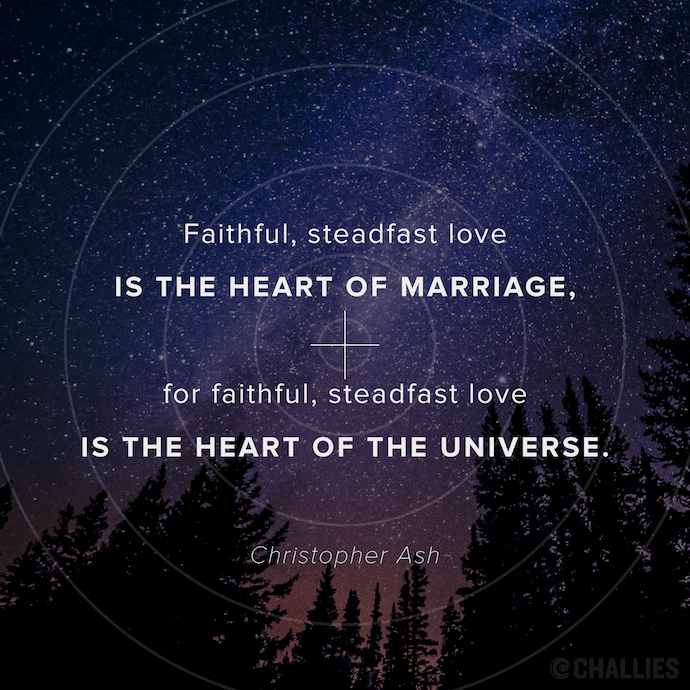
]]>Faithful, steadfast love is the heart of marrage, for faithful, steadfast love is the heart of the universe.
—Christopher Ash
 It’s not like we’re hurting for books on marriage. In fact, there may be more Christian books on marriage than on any topic besides prayer. This means that any new book has to be awfully good to stand out from an already-crowded field. It was pure joy, then, to read Christopher Ash’s Married for God: Making Your Marriage the Best It Can Be and see it do exactly that. It is one of the very best books on marriage I have ever read—and I’ve read a lot of them. First published in the U.K. in 2007, Married for God has only just made its way across the Atlantic thanks to Crossway. Ash, who serves as Writer in Residence at Tyndale House in Cambridge, describes his book simply: It’s “a straightforward account of what the Bible teaches about marriage.” He offers it for consideration in a variety of contexts: for individuals who wish to use it for private study, for engaged couples preparing for marriage, for married couples interested in an informal marriage refresher, or for churches to use as the foundation for a brief course on marriage. Many marriage books focus on the how questions. How can we have better communication? How can we grow in our ability to resolve conflict? How can we have better sex? Others focus on the what questions. What is marriage? What are its boundaries? What kind of people may participate in it? Ash, though, chooses to focus first and primarily on the why questions, for “If we get our…]]>
It’s not like we’re hurting for books on marriage. In fact, there may be more Christian books on marriage than on any topic besides prayer. This means that any new book has to be awfully good to stand out from an already-crowded field. It was pure joy, then, to read Christopher Ash’s Married for God: Making Your Marriage the Best It Can Be and see it do exactly that. It is one of the very best books on marriage I have ever read—and I’ve read a lot of them. First published in the U.K. in 2007, Married for God has only just made its way across the Atlantic thanks to Crossway. Ash, who serves as Writer in Residence at Tyndale House in Cambridge, describes his book simply: It’s “a straightforward account of what the Bible teaches about marriage.” He offers it for consideration in a variety of contexts: for individuals who wish to use it for private study, for engaged couples preparing for marriage, for married couples interested in an informal marriage refresher, or for churches to use as the foundation for a brief course on marriage. Many marriage books focus on the how questions. How can we have better communication? How can we grow in our ability to resolve conflict? How can we have better sex? Others focus on the what questions. What is marriage? What are its boundaries? What kind of people may participate in it? Ash, though, chooses to focus first and primarily on the why questions, for “If we get our…]]>
It’s not like we’re hurting for books on marriage. In fact, there may be more Christian books on marriage than on any topic besides prayer. This means that any new book has to be awfully good to stand out from an already-crowded field. It was pure joy, then, to read Christopher Ash’s Married for God: Making Your Marriage the Best It Can Be and see it do exactly that. It is one of the very best books on marriage I have ever read—and I’ve read a lot of them.
First published in the U.K. in 2007, Married for God has only just made its way across the Atlantic thanks to Crossway. Ash, who serves as Writer in Residence at Tyndale House in Cambridge, describes his book simply: It’s “a straightforward account of what the Bible teaches about marriage.” He offers it for consideration in a variety of contexts: for individuals who wish to use it for private study, for engaged couples preparing for marriage, for married couples interested in an informal marriage refresher, or for churches to use as the foundation for a brief course on marriage.
Many marriage books focus on the how questions. How can we have better communication? How can we grow in our ability to resolve conflict? How can we have better sex? Others focus on the what questions. What is marriage? What are its boundaries? What kind of people may participate in it? Ash, though, chooses to focus first and primarily on the why questions, for “If we get our aims clear, then we shall see why marriage has to be what it is, and we will be well placed to see how to build a strong marriage.” He grounds his book on this foundational statement: “We ought to want what God wants in marriage. Or, to put it another way, God’s why matters more than my why.” If this is the case, “You and I need to ask God what he wants and then line up our goals behind his, rather than expecting him to line up his goals behind ours.” Marriage at its best is marriage that is aligned with God’s purposes.
The first chapter is dedicated to baggage and grace. None of us comes into marriage without some kind of background, some kind of baggage. We each have our unique histories “of sexual experience or inexperience; of hopes realized or deferred; of longings or aversions; of fulfillment or frustration; of fears, anxieties, delights, regrets. What we have done or not done, how we have been treated or mistreated by others: all these things shape what we believe.” Those who carry baggage need grace to deal with it, for “Unless we understand grace, we will misunderstand all the Bible’s teaching about sex and marriage.” Thankfully the Bible speaks to those whose pasts are spoiled or ruined, and it speaks equally to those convinced they enter marriage utterly pure and undefiled. “Never forget that [the Bible] speaks to those with spoiled and damaged histories, to whom Jesus Christ offers forgiveness and restoration, and never forget that by his grace God can turn a spoiled life into a life of growing purity, which will be perfected when he gives us resurrection bodies at the end.”
As he turns to marriage itself, Ash outlines the three traditional purposes for marriage: Children rather than barrenness, faithfulness rather than selfishness, and order rather than chaos. The heart of the book is a chapter-length examination of each. But before he can do that, he exposes one too-common teaching as wrong and destructive: Marriage as the answer to loneliness. No, “marriage is not God’s answer for loneliness. Indeed, marriage is not God’s provision to meet your or my needs. We would like to think that it is. But God has bigger purposes in the world than meeting our needs.” If we believe marriage is about loneliness, we believe that ultimately it exists for us, for the meeting of our deep needs. But the Bible tells us that marriage exists for God—so we can serve God in and through it. Ash describes marriage as “sex in the service of God.” By “sex” he does not mean merely the act of sexual intercourse, but the whole relationship and intimacy it typifies. Sex is the most distinctive component of marriage and, in that way, an apt summary of the whole thing.
He then dedicates one chapter to each of marriage’s main purposes—procreation as a means to creating more people to carry out God’s will on earth, sex and intimacy as a means of displaying God’s love and faithfulness for his bride, and marriage as an institution to bring order from the chaos of society. He includes a chapter on God’s plan in singleness and one on the heart of marriage, showing that “the heart of marriage is faithfulness,” the kind of covenant faithfulness we see God displaying from Genesis 1 to Revelation 22.
By the end, he has done exactly what he set out to do: He has offered a challenging, straightforward, deeply-biblical, and counter-cultural description of the purposes of marriage, the challenges of marriage, and the joys of marriage.
As Ash begins his book he tells who may benefit by reading it:
If you are engaged, I hope this book will help you prepare for marriage. I hope you will find here Bible teaching to consider together as a couple that will shape your hopes and expectations in a healthy way. If you are in the first few years of marriage
or even later), I hope this book will help you lay foundations for a good marriage. Whether you received good marriage preparation or none, I hope this presentation of the Bible’s teaching will challenge and refresh you both. If you are single and wondering whether to get married, I hope you will find here clear Bible teaching about what marriage is, and—more important—what is the point and purpose of marriage. If you are single and disappointed, because the opportunity for marriage has not (or not yet) come your way, I hope that you too will find here some comfort and encouragement to live your present unmarried life wholeheartedly and joyfully for Christ. And, for that matter, if you have no intention of being married, this book may help you understand and encourage those who are. (Italics added.
By my assessment, Married for God succeeds in each of these ways and will prove a blessing to each of these people. I will go ahead and recommend it in every way. It really is among the very best books on marriage.
]]> I spent last weekend at a pair of conferences, each of which dealt in some way with matters of human sexuality. Such conferences are common today as Christians attempt to understand, interpret, and respond to the moral revolution raging around us. It struck me that just three or four years ago these events were discussing issues of marriage in the face of the likelihood that the institution of marriage would soon be opened to homosexual couples. For most people today that concern seems almost quaint, like debating whether women should be allowed to vote. The conversation has shifted so dramatically that the question today is whether there is any real meaning or significance in something as foundational to humanity as biological sex—a conversation we carry on as people begin to choose bathrooms and change rooms not on the basis of sex but of identity, of feelings rather than fact. Of all the questions asked over the course of the weekend, there is one that stands out to me: Who does my body belong to? In some ways this question stands at the very heart of our cultural conversation. A speaker asked the question in one seminar but, because of time constraints, could offer only a partial answer. I’ve found myself pondering it in the days since. So, who does my body belong to? The Christian answer is obvious: My body belongs to God. In fact, my body is owned twice by God, once because he created it and again because he redeemed it. “I praise…]]>
I spent last weekend at a pair of conferences, each of which dealt in some way with matters of human sexuality. Such conferences are common today as Christians attempt to understand, interpret, and respond to the moral revolution raging around us. It struck me that just three or four years ago these events were discussing issues of marriage in the face of the likelihood that the institution of marriage would soon be opened to homosexual couples. For most people today that concern seems almost quaint, like debating whether women should be allowed to vote. The conversation has shifted so dramatically that the question today is whether there is any real meaning or significance in something as foundational to humanity as biological sex—a conversation we carry on as people begin to choose bathrooms and change rooms not on the basis of sex but of identity, of feelings rather than fact. Of all the questions asked over the course of the weekend, there is one that stands out to me: Who does my body belong to? In some ways this question stands at the very heart of our cultural conversation. A speaker asked the question in one seminar but, because of time constraints, could offer only a partial answer. I’ve found myself pondering it in the days since. So, who does my body belong to? The Christian answer is obvious: My body belongs to God. In fact, my body is owned twice by God, once because he created it and again because he redeemed it. “I praise…]]>
I spent last weekend at a pair of conferences, each of which dealt in some way with matters of human sexuality. Such conferences are common today as Christians attempt to understand, interpret, and respond to the moral revolution raging around us. It struck me that just three or four years ago these events were discussing issues of marriage in the face of the likelihood that the institution of marriage would soon be opened to homosexual couples. For most people today that concern seems almost quaint, like debating whether women should be allowed to vote. The conversation has shifted so dramatically that the question today is whether there is any real meaning or significance in something as foundational to humanity as biological sex—a conversation we carry on as people begin to choose bathrooms and change rooms not on the basis of sex but of identity, of feelings rather than fact.
Of all the questions asked over the course of the weekend, there is one that stands out to me: Who does my body belong to? In some ways this question stands at the very heart of our cultural conversation. A speaker asked the question in one seminar but, because of time constraints, could offer only a partial answer. I’ve found myself pondering it in the days since.
So, who does my body belong to? The Christian answer is obvious: My body belongs to God. In fact, my body is owned twice by God, once because he created it and again because he redeemed it. “I praise you, for I am fearfully and wonderfully made” (Psalm 139:14); “For you were bought with a price. So glorify God in your body” (1 Corinthians 6:20). God has the right of ownership and the right of redemption. I am to relate to my body as a grateful steward rather than an autonomous owner. This is my solemn responsibility, to gladly surrender my body to God, to use it in the ways he commands. I surrender it by denying myself forbidden desires or pleasures (1 Thessalonians 4:4), by pursuing the highest desires and pleasures (Proverbs 5:19, 1 Corinthians 7:1-5), and by my willingness to even see it destroyed in his service (2 Corinthians 11:25-29). God-followers have always placed great importance on using the body to procreate as a means of carrying out God’s creation mandate that we “fill the earth and subdue it” (Genesis 1:28). Understanding God’s ownership of the body not only limits behavior that God says is unworthy of his creatures, but promotes behavior that God says is good for his creatures.
Just pause for one moment to consider this kind of a world—a world in which each person glorifies God in his or her body all the time. This is the world of Genesis 1 and 2. The rest of the Bible and the rest of human history show with undisputed clarity that one of the consequences of sin is the selfish reclamation of our bodies. (A subsequent answer that I will not deal with at this time is that after God, my wife owns my body—see 1 Corinthians 7:1-5).)
Who owns my body? God does. There is another answer, though, and while it can easily be traced to a biblical understanding of the world, it is found even in cultures that have long since lost or denied God’s Word: My body belongs to my people, to my ancestors and descendants. People have traditionally had a strong sense of the unity of past, present, and future. And this was true—and still is true—for many cultures. I would be expected to honor my ancestors by carrying on the family line and I would be expected to honor my descendants by ensuring that there actually would be descendants. No horror could be greater than the horror of a family line coming to an end (see, for example, 1 Samuel 2:27-36). Thus my body belongs to the past and the future—it belongs to my people. This brings with it the responsibility to use my body to procreate, to create future generations. Even without reference to the God of the Bible, this sense of responsibility puts a kind of governor on human behavior that might cause me to turn away from certain desires in order to fulfill my familial and societal obligations.
Again, pause to consider this kind of a world. This may not be a Christian world, but it is still a world that understands the goodness of family and the stability the family unit brings to individuals and to all of society.
And now we advance to modern Western society and we see that all limits and governors have been taken off—they’ve been taken off, thrown down, and stamped into the dust. Who does my body belong to? In a society obsessed with autonomy, personal rights, and total sexual freedom, my body belongs to me—to me and only me. I bear no responsibility to God because there is no God. Or even if I do acknowledge deity, the responsibility I bear to him is to be true to myself and to my own desires, for of course that is what he wants for me. I bear no responsibility to those who have come before me; their desires and sacrifices lay no obligation on me to ensure that there will be a generation who follows. The past is the past and the future is of no concern to me if it interferes with my joy in the present. My body is mine, thank you very much, and I owe it to myself to use it however I will.
Do you see how far we’ve come? The Bible says that my body belongs to God. Even Godless traditional societies will at least say that my body belongs to my people. But here and now my body belongs to me and it is outright bigotry for you to impose upon me any obligation to the contrary.
What do we do about this? The answer is simple: We obey God. As Christians, we celebrate the beautiful fact that we were each handcrafted by God, we have been bought with a price, and we now have the joyful responsibility and privilege of glorifying God in our bodies. We live in this way before a dark, selfish world and simply let God’s light shine.
Image credit: Shutterstock
]]> The last couple of weeks have been fairly quiet when it comes to letters to the editor. Not surprisingly, the majority of them dealt with the article I wrote on evolution and the age of the universe. Here are a small selection of letters. Comments on Spiritual Drafting and the Danger of Christian Complacency Thanks so much for this article. One point to add is that drafting actually helps the person in front go faster due to less personal wind drag. I think you could develop more spiritual applications with this principle in mind. My wife and I ride bikes… well, now we ride one bike—a tandem. This bike is now our bike of choice and “two are better than one, for they have a good reward for their labor”. Just some thoughts. Thanks for your ministry!—David D, Meridian, ID Tim: Yes, I am aware that drafting actually benefits the lead rider as well. It’s something to do with physics, I suppose. But to admit that it benefits the lead rider would have damaged my analogy so I just chose to ignore it! And, actually, I think I’m on good ground there since even in the Bible analogies or parables are used to prove one point without fully exploring every angle. They all fall part at one time or another. Comments on Evolution and a Universe as Young as Humanity Tim: I knew when I wrote this article that I was going to receive responses. I was grateful to see how many of them were…]]>
The last couple of weeks have been fairly quiet when it comes to letters to the editor. Not surprisingly, the majority of them dealt with the article I wrote on evolution and the age of the universe. Here are a small selection of letters. Comments on Spiritual Drafting and the Danger of Christian Complacency Thanks so much for this article. One point to add is that drafting actually helps the person in front go faster due to less personal wind drag. I think you could develop more spiritual applications with this principle in mind. My wife and I ride bikes… well, now we ride one bike—a tandem. This bike is now our bike of choice and “two are better than one, for they have a good reward for their labor”. Just some thoughts. Thanks for your ministry!—David D, Meridian, ID Tim: Yes, I am aware that drafting actually benefits the lead rider as well. It’s something to do with physics, I suppose. But to admit that it benefits the lead rider would have damaged my analogy so I just chose to ignore it! And, actually, I think I’m on good ground there since even in the Bible analogies or parables are used to prove one point without fully exploring every angle. They all fall part at one time or another. Comments on Evolution and a Universe as Young as Humanity Tim: I knew when I wrote this article that I was going to receive responses. I was grateful to see how many of them were…]]>
The last couple of weeks have been fairly quiet when it comes to letters to the editor. Not surprisingly, the majority of them dealt with the article I wrote on evolution and the age of the universe. Here are a small selection of letters.
Comments on Spiritual Drafting and the Danger of Christian Complacency
Thanks so much for this article. One point to add is that drafting actually helps the person in front go faster due to less personal wind drag. I think you could develop more spiritual applications with this principle in mind. My wife and I ride bikes… well, now we ride one bike—a tandem. This bike is now our bike of choice and “two are better than one, for they have a good reward for their labor”. Just some thoughts. Thanks for your ministry!
—David D, Meridian, IDTim: Yes, I am aware that drafting actually benefits the lead rider as well. It’s something to do with physics, I suppose. But to admit that it benefits the lead rider would have damaged my analogy so I just chose to ignore it! And, actually, I think I’m on good ground there since even in the Bible analogies or parables are used to prove one point without fully exploring every angle. They all fall part at one time or another.
Comments on Evolution and a Universe as Young as Humanity
Tim: I knew when I wrote this article that I was going to receive responses. I was grateful to see how many of them were kind and challenging. The great majority compared space to time and said that if I want to say that the vastness of time causes trouble with my understanding of creation, I also need to deal with the vastness of space. Here are just a couple of examples.
The theological thrust of this article seems to be missing something. If you think we need to deny the vastness of TIME for the theological reason that it makes humanity too insignificant, you’d also need to deny the vastness of SPACE, a similarly tiny proportion of which is directly relevant to humanity. In fact, on this reasoning, vast space is a bigger problem than vast time. Any amount of time can be understood as all purposed by God to lead up to humanity, while nothing similar can be said of all space.
Fortunately, there is no theological reason to deny the vastness of either time or space. Psalm 8 reflects on Genesis 1 and gives us two truths about humanity side-by-side. A. Humanity is extremely insignificant compared to the vastness of what God has created (v3-4, alluding to Genesis 1 day 4). B. Yet, despite that, God has graciously given humanity authority to rule creation like God himself (v5-8, alluding to Genesis 1 day 6). So an increased appreciation of the vastness of time and space would not deny that we’ve been appointed to a central position in creation (B). Instead it would deepen our appreciation of the vastness of creation relative to ourselves (A) and so deepen our appreciation of God’s GRACE in appointing us to a central, God-like position over creation (B).
—Jeremy W, Brisbane Australia
I have been a longtime fan of this blog, but I think Mr. Challies’ basic argument regarding the age of the universe has some deep flaws.
He writes: “If we admit and endorse an ancient universe, we see a vastly purposeless universe that for the great majority of time had no human beings to bring purpose and order to it. We see that humanity’s role in the universe is late and incidental rather than timely and purposeful.” This simply does not follow. For one, there’s no necessary, logical entailment from the “If” to the “then”. But worse, it seems to presuppose the unbiblical notion that it is man’s presence in the universe that gives the universe purpose and order. There is nothing in Scripture that supports this idea, and I’m sure Mr. Challies does not believe this.
True, man is the image-bearer of God and at the center of redemptive history, but that must be counter-balanced by the fact that we find ourselves at that center because of our sin and neediness— on this score, God’s Word teaches us that it is NOT all about us. And so, on the contrary, one could just as easily take this 24-hour clock analogy as a healthy antidote to human pride, with the lesson being that if we’re this small on a scale of just a few billion years, how much more compared to the eternality and perfection of God?
Indeed, if Challies’s presupposition, above, would apply to an ancient universe, then it would also apply to a 5 literal-days-old universe—but again, Challies would never admit to the notion that creation was “vastly purposeless” for the great majority of the first 5 days of the creation week because he understands that what gave the creation purpose and order was God’s work, not man’s. Man’s work was designed to bring glory to God by imaging the order and dominion that God has manifest from eternity past—following the creation week. But if Mr. Challies can believe, on theological grounds, that a “human-less” creation can still manifest God’s purpose, direction, and design for a relatively short span of time, why not also for a relatively “long” span of time, with God directing the details (as theistic evolutionists argue)?
So our presence and work in the universe is just a blip on the cosmic radar?—welcome to finite existence, and meet your infinite Creator, O man of dust, whose life is a vapor!
Further, if we extended Challies’ logic about mankind’s significance relative to time, we should also wonder why we can’t also apply it to space—but then we might reach the absurd conclusion that the universe, indeed, even our own galaxy, can’t possibly be as large as scientists say that it is, as that too would diminish man’s place in creation.
And finally, what would this logic force us to conclude when we consider that Jesus—the God-Man—only stepped into human history for a mere 33 years? Even in a universe that is only 10,000 years old, Jesus’ ministry would proportionately comprise only 25 seconds of a 24-hour day. And yet, from this, we would certainly not draw the kind of conclusion that Challies draws regarding man’s place in an ancient universe, as we know that it is God Himself who gives great significance to “brief” events.
In the end, this kind of argument seems to unwittingly Christianize the pronouncement of Protagoras that “man is the measure of all things”, which the Greeks and Romans maintained for centuries. For centuries, this notion helped entrench the geo-centric model of the universe, not a God-centered one, as some of its advocates in the Church supposed.
Let me be clear: I am certainly not accusing Mr. Challies of failing to be “God-centered”—indeed, I believe he is devoutly God-centered. Nor am I a theistic evolutionist: I would cheerfully join Mr. Challies in mustering arguments against it, in fact. I just wouldn’t use this one.
Rather, I would simply encourage Mr. Challies and his readers to continue to think more critically about the kinds of arguments that are used on all sides of this debate in order to better harmonize our understanding of science and Scripture so that the God of Scripture would be magnified.
—Eric T, La Mirada, CA
Comments on Our Forgetful God
]]>Many thanks for all your insightful posts! I always enjoy reading what you write.
I, however, cannot agree with you that God forgets things. As Jay Adams points out in his book From Forgiven to Forgiving, God does not forget, He not-remembers. That is, He stops bringing things up. God is omniscient. To say that God forgets something, at least in the normal way people forget things, is contrary to this attribute of God.
Not-remembering is at the heart of forgiveness, as Jay Adams points out. Indeed, one of the chief points of interest in that book is Adams’s definition of forgiveness as a three-fold promise: when you forgive someone, you are making a promise that you will not bring the matter up again either to the person who offended you, or to anyone else, or to yourself.
Applying this definition to God’s forgiveness towards us, forgiveness is a promise that God will not-remember our sins against us. He will not bring them up again. Of course He knows that we actually did those sins.
This distinction between not-remembering and forgetting is crucial, I think. Forgetting is a human thing where we once knew something, and some time later we do not know it. God forgets nothing, because He knows everything. Not-remembering is a decision, a promise, never to bring something up again, and it is this, not forgetting, that is at the heart of forgiveness.
—Adrian K, Park City, KSTim: I believe you and I are saying roughly the same thing. I am teeing off a passage which says that God forgets our sins. I understand that God’s forgetting is a particular kind of forgetting—the kind that Jay Adams helpfully labels as a “not-remembering.” But because the Bible says God forgets, I think we are on good grounds to say it as well.
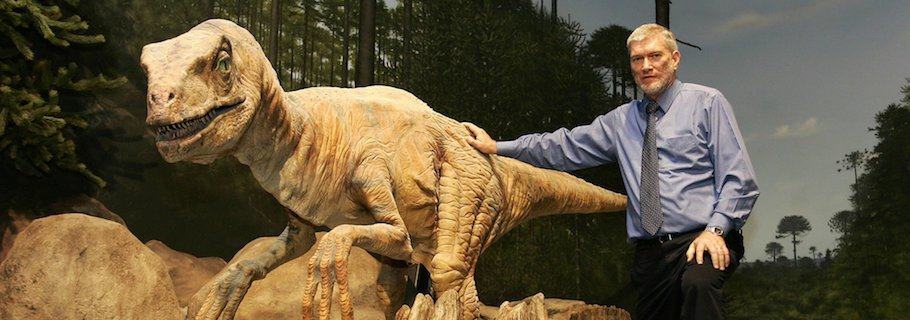 Yesterday Kenneth Keathley, a professor at Southeastern Baptist Theological Seminary, described on his blog how Ken Ham of Answers in Genesis has changed his position on one key element of evolution (see “Ken Ham Embraces Evolution“). He pointed to an article in the latest issue of Answers magazine, a publication of Answers in Genesis, and said, “The article is noteworthy because it argues for macro-evolution; the theory that the species of today evolved from prior, extinct species.” If true, this is indeed a substantial and noteworthy shift. Not surprisingly, Dr. Keathley’s blog post was soon distributed through social media where some people reacted with more than a little surprise. But I don’t think Ken Ham or his organization have actually embraced evolution of the kind Keathley describes. Keathley’s main point is the claim that young-earth creationists, Ken Ham foremost among them, are now embracing what he describes as macro-evolution. Looking at the Answers article and citing both a paper delivered at ETS and a book published by an Answers in Genesis geologist, Keathley says, “In their academic and scholarly writings, members of Answers in Genesis have started to accept the notion that species evolve into other species. … They are acknowledging that, indeed, the fossil record does in fact give evidence of transitional life forms. They seem to be trying to go where the evidence leads them and at the same time continue to hold to their core beliefs.” But I don’t think the evidence Dr. Keathley offers backs up his claim. If I understand…]]>
Yesterday Kenneth Keathley, a professor at Southeastern Baptist Theological Seminary, described on his blog how Ken Ham of Answers in Genesis has changed his position on one key element of evolution (see “Ken Ham Embraces Evolution“). He pointed to an article in the latest issue of Answers magazine, a publication of Answers in Genesis, and said, “The article is noteworthy because it argues for macro-evolution; the theory that the species of today evolved from prior, extinct species.” If true, this is indeed a substantial and noteworthy shift. Not surprisingly, Dr. Keathley’s blog post was soon distributed through social media where some people reacted with more than a little surprise. But I don’t think Ken Ham or his organization have actually embraced evolution of the kind Keathley describes. Keathley’s main point is the claim that young-earth creationists, Ken Ham foremost among them, are now embracing what he describes as macro-evolution. Looking at the Answers article and citing both a paper delivered at ETS and a book published by an Answers in Genesis geologist, Keathley says, “In their academic and scholarly writings, members of Answers in Genesis have started to accept the notion that species evolve into other species. … They are acknowledging that, indeed, the fossil record does in fact give evidence of transitional life forms. They seem to be trying to go where the evidence leads them and at the same time continue to hold to their core beliefs.” But I don’t think the evidence Dr. Keathley offers backs up his claim. If I understand…]]>
Yesterday Kenneth Keathley, a professor at Southeastern Baptist Theological Seminary, described on his blog how Ken Ham of Answers in Genesis has changed his position on one key element of evolution (see “Ken Ham Embraces Evolution“). He pointed to an article in the latest issue of Answers magazine, a publication of Answers in Genesis, and said, “The article is noteworthy because it argues for macro-evolution; the theory that the species of today evolved from prior, extinct species.” If true, this is indeed a substantial and noteworthy shift. Not surprisingly, Dr. Keathley’s blog post was soon distributed through social media where some people reacted with more than a little surprise. But I don’t think Ken Ham or his organization have actually embraced evolution of the kind Keathley describes.
Keathley’s main point is the claim that young-earth creationists, Ken Ham foremost among them, are now embracing what he describes as macro-evolution. Looking at the Answers article and citing both a paper delivered at ETS and a book published by an Answers in Genesis geologist, Keathley says, “In their academic and scholarly writings, members of Answers in Genesis have started to accept the notion that species evolve into other species. … They are acknowledging that, indeed, the fossil record does in fact give evidence of transitional life forms. They seem to be trying to go where the evidence leads them and at the same time continue to hold to their core beliefs.”
But I don’t think the evidence Dr. Keathley offers backs up his claim. If I understand correctly, what he describes is “speciation,” “the formation of new and distinct species in the course of evolution.” But there is no controversy here. Young-earth creationists have embraced speciation—within defined limits, mind you—almost as long as young-earth creation has been a movement. Henry Morris was referencing it as far back as 1961 in The Genesis Flood and he himself was drawing on the work of his precedessors. Young-earth creationists have been articulating their understanding of limited speciation from science and from Scripture for a long time. So, too, have Ken Ham and Answers in Genesis.
You see, young-earth creationists believe that God created “kinds” of living things, taking their cue from the repeated use of “kind” in Genesis 1—God created plants and animals “each according to its kind.” But what is a “kind?” The answer to that question makes a world of difference. To answer it you will need to think back to science class and the classification or taxonomy of living things. Living things are classified in groupings that get progressively more numerous, beginning with kingdom and ending with species. You probably remember the 7 headings:
- Kingdom
- Phylum
- Class
- Order
- Family
- Genus
- Species
There are five or six kingdoms, each of which describes one of the classifications of living organisms—the animal kingdom, plant kingdom, and so on. If we look within the animal kingdom, we will find approximately 35 phyla, each of which is comprised of a number of classes. They, in turn, are comprised of a number of orders. And so it goes until we arrive at the innumerable species. Young-earth creationists do not “reject the majority of classifications by evolutionary biologists but [rather, reject] the evolutionary history associated with the classifications…”1
When a young-earth creationist speaks of the “kinds” that God created, which of these 7 classifications does it best match up with? Typically, young-earth creationists have answered that “kinds” approximate “family.” Therefore, God created animals each according to their “family,” the fifth level of the taxonomy. So, for example, all cats—pets, lions, and leopards—belong to the same biological family. Hence, according to this model, God created a cat prototype in Genesis 1, and Noah would have taken two of these cat-family creatures on board the Ark. From those two cats have descended (or “speciated”) the more than 30 species of cats alive today. This is sometimes referred to as micro-evolution, or evolution within a particular family, genus, or species.
Instead of using an evolutionary “tree of life” model which shows all of life descending from a common ancestor, many young-earth creationists prefer an orchard illustration of the kind Ken Ham used in his debate with Bill Nye:
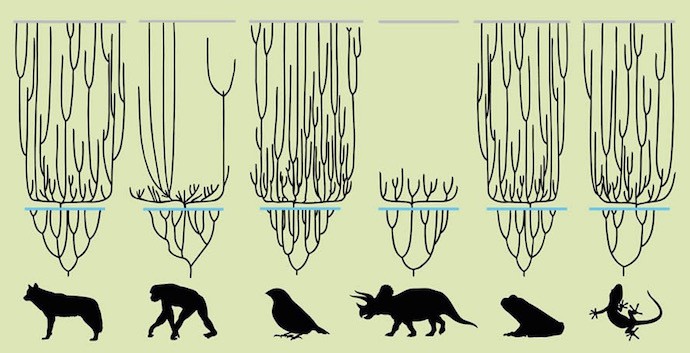
This orchard model shows that there are many descendants from each kind, some that have survived and many that have not, and that there is no overlap between the kinds. In this way the dog kind is unrelated to the lizard and bird kinds; they share no common ancestry. “While new species have been observed to arise, it is always within the limits of the created kinds.”1 (Note that the orchard diagram also uses the blue line for the flood to display an increase in speciation after that event.)
What young-earth creationists deny is that speciation has occurred at the levels of order, class, phylum, or kingdom. One order of animals cannot change into another order of animals; animals and plants do not share a common ancestor. In other words, unless I am misunderstanding something, the article Keathley cites is really only saying what young-earth creationists have said all along—that micro-evolution does occur and that it occurs at and below the level of family. If that is the case, neither Ken Ham nor the organization he founded have changed what they believe. Ken Ham has not embraced evolution.
]]> ]]>
]]> Can you briefly (and as objectively as possible) lay out the different options when it comes to the historical Adam? What are the predominant views?
Can you briefly (and as objectively as possible) lay out the different options when it comes to the historical Adam? What are the predominant views?
 There are really five possible views:
There are really five possible views:
- Adam was specially created by God on the sixth day, as understood by the literal interpretation of the Genesis text. Adam is created without ancestry, apart from any evolutionary processes. He is the first human.
- Adam was specially created in the manner that Genesis describes (out of the dust, life breathed into him), but without the time frame of six days of ordinary duration—it occurred at some unknown point in the ancient past. Adam is created without ancestry, and apart from any evolutionary processes. He is the first human.
- Adam was created through a combination of natural processes and supernatural, divine intervention at some unknown point in the ancient past. Evolutionary processes played a part in Adam’s creation, he had animal ancestry, but God intervened, doing something special in his conception, or making him human after birth, even though his biological parents were not. Some argue that God’s intervention included changing Adam’s physical constitution; others argue that it was only God’s gift of a spiritual constitution or soul that set Adam apart from his animal ancestors.
- Adam developed the same way as in #3, but he was simply an individual whom God entered into relationship with, making Adam religious. The immediate change that made Adam “human” was relational, not constitutional.
- There was no Adam. Adam is simply a figure or type for early humanity as a category.
While these are the five main categories, it is helpful to be aware of their place and proportion. The historic, mainstream understanding of the Christian church is view #1. Despite continuing efforts to the contrary it remains the predominant view among evangelical Christians. By contrast, view #2, rooted in post-Enlightenment geological theories, is actually a minority stream. Views #3–5, while trendy, very vocal, and on the evangelical edge (where broad evangelicalism merges into theological liberalism), actually represent an even smaller fringe than view #2.
Ongoing round-tables and “four views on Genesis and origins” type books produced by parts of evangelical academia are misleading. They give the impression that the literal understanding of origins is a minority when it actually remains an overwhelming majority commitment, much to the chagrin of its opponents.
 What is really at stake here? What does the church stand to lose if we widely accept an alternate view of the historical Adam?
What is really at stake here? What does the church stand to lose if we widely accept an alternate view of the historical Adam?
 The teaching of God’s Word is at stake here. God’s character is at stake. The gospel of Jesus Christ is at stake. Accepting an Adam with evolutionary origins immediately impacts what it means to be human, created by God in His image. It opens a Pandora’s box of theological problems—from Adam’s relationship with his animal parents and surrounding community, to the doctrine of sin and the fall, to God’s holiness, goodness, and justice. It immediately impacts the doctrine of Christ as the One by whom all things were created, as well as His incarnation and work of salvation. It’s an issue that touches so many others: from soteriology to race relations to sexual ethics to the new creation at the second coming. Those who take the logically consistent step beyond an evolutionary Adam to a figurative Adam join a line of thinkers including Voltaire and Kant.
The teaching of God’s Word is at stake here. God’s character is at stake. The gospel of Jesus Christ is at stake. Accepting an Adam with evolutionary origins immediately impacts what it means to be human, created by God in His image. It opens a Pandora’s box of theological problems—from Adam’s relationship with his animal parents and surrounding community, to the doctrine of sin and the fall, to God’s holiness, goodness, and justice. It immediately impacts the doctrine of Christ as the One by whom all things were created, as well as His incarnation and work of salvation. It’s an issue that touches so many others: from soteriology to race relations to sexual ethics to the new creation at the second coming. Those who take the logically consistent step beyond an evolutionary Adam to a figurative Adam join a line of thinkers including Voltaire and Kant.
 Do you think there is an inevitability here? Do you think that those who deny a historical Adam are necessarily on a slope to full-out theological liberalism?
Do you think there is an inevitability here? Do you think that those who deny a historical Adam are necessarily on a slope to full-out theological liberalism?
 The denial of a historical Adam is already theological liberalism, beyond the bounds not only of evangelicalism, but also historic Christianity. There is an inevitability of further decline, not always in the case of the individual who departs further from Christian orthodoxy, but almost always in the next generation, and in any institution or church that allows this. The underlying problem is the capitulation to reading Scripture through the lens of this world’s culture and thought, rather than reading culture and thought through the lens of Scripture.
The denial of a historical Adam is already theological liberalism, beyond the bounds not only of evangelicalism, but also historic Christianity. There is an inevitability of further decline, not always in the case of the individual who departs further from Christian orthodoxy, but almost always in the next generation, and in any institution or church that allows this. The underlying problem is the capitulation to reading Scripture through the lens of this world’s culture and thought, rather than reading culture and thought through the lens of Scripture.
 Are all 4 of the alternatives to the literal reading of Genesis 1 equally dangerous? Or do you think there is room within Christian orthodoxy for some or all of them?
Are all 4 of the alternatives to the literal reading of Genesis 1 equally dangerous? Or do you think there is room within Christian orthodoxy for some or all of them?
 I don’t believe that we should ever say there is room in Christian orthodoxy for “lesser” error: if something is unscriptural we should not give it a pass. Christian orthodoxy should not be viewed as the “core concepts” of biblical Christianity; orthodoxy is the whole counsel of God’s Word. Our job is to be committed to being conformed to Christ, to the Word, in all things. This should be our passion and joy, pursued in love for Christ, His church, and a world in desperate need of the complete gospel.
I don’t believe that we should ever say there is room in Christian orthodoxy for “lesser” error: if something is unscriptural we should not give it a pass. Christian orthodoxy should not be viewed as the “core concepts” of biblical Christianity; orthodoxy is the whole counsel of God’s Word. Our job is to be committed to being conformed to Christ, to the Word, in all things. This should be our passion and joy, pursued in love for Christ, His church, and a world in desperate need of the complete gospel.
But Christians are at various points in their spiritual growth, so, as one theologian said, “a man may be in error, and yet not be a heretic.” Someone may hold to an error at some point and still be a Christian. Understood this way, the first alternative view on human origins is the least problematic: you can hold to view #2 and retain an orthodox view of Adam, but it is nonetheless error requiring correction because it requires hermeneutical choices which set the stage for worse alternative views, in Genesis and elsewhere. Views #3 and #4 move significantly further into error. #5, with its flat out denial of Adam, brings one into the realm of heresy. The Quest for the Historical Adam details the historical realities and theological consequences of each of these in contrast to the coherence and orthodoxy of the literal understanding of our origins.
 Should the average Christian church-goer get informed about this issue, or is it one where we can allow the scholars to work it out?
Should the average Christian church-goer get informed about this issue, or is it one where we can allow the scholars to work it out?
 Average Christian church-goers cannot afford to ignore this issue. Its erosive impact is continuing, if not gathering steam, in American evangelicalism. It may impact you directly through the minister you call or the elders you ordain: discernment here is essential for the church’s life and future.
Average Christian church-goers cannot afford to ignore this issue. Its erosive impact is continuing, if not gathering steam, in American evangelicalism. It may impact you directly through the minister you call or the elders you ordain: discernment here is essential for the church’s life and future.
Our children are likely to face the denial of the historical Adam at many Christian colleges—under the guise of Christian education. The issue is not just for us, but for our children’s future in the faith and for the continued expansion of the kingdom of Christ. Despite the naysayers who say “there is no slippery slope,” church history shows over and over that those who buy into alternate views of human origins are getting on the road that leads to complete abandonment of biblical Christianity.
I believe the best way to be informed is not found in immersing ourselves in books that present various views of the creation account, but by understanding Scripture’s richness, beauty, and cohesiveness on our origin, taught by faithful expositors and theologians for millennia. We must begin recapturing the marvelous reality of the literal understanding of our origin, all it entails, and how it applies to our lives. This was a key part of my aim in The Quest for the Historical Adam. When we understand the reality of what God has said and done, we will not trade our birthright for a pot of stew. We will worship our Creator and Redeemer.
 Beyond your own book, what are some other resources that could prove helpful in getting oriented in this conversation?
Beyond your own book, what are some other resources that could prove helpful in getting oriented in this conversation?
 Yes, I would recommend two recent books: Richard Gaffin’s No Adam, No Gospel (P&R, 2015), and the collected essays in the volume God, Adam and You (P&R, 2015).
Yes, I would recommend two recent books: Richard Gaffin’s No Adam, No Gospel (P&R, 2015), and the collected essays in the volume God, Adam and You (P&R, 2015).
